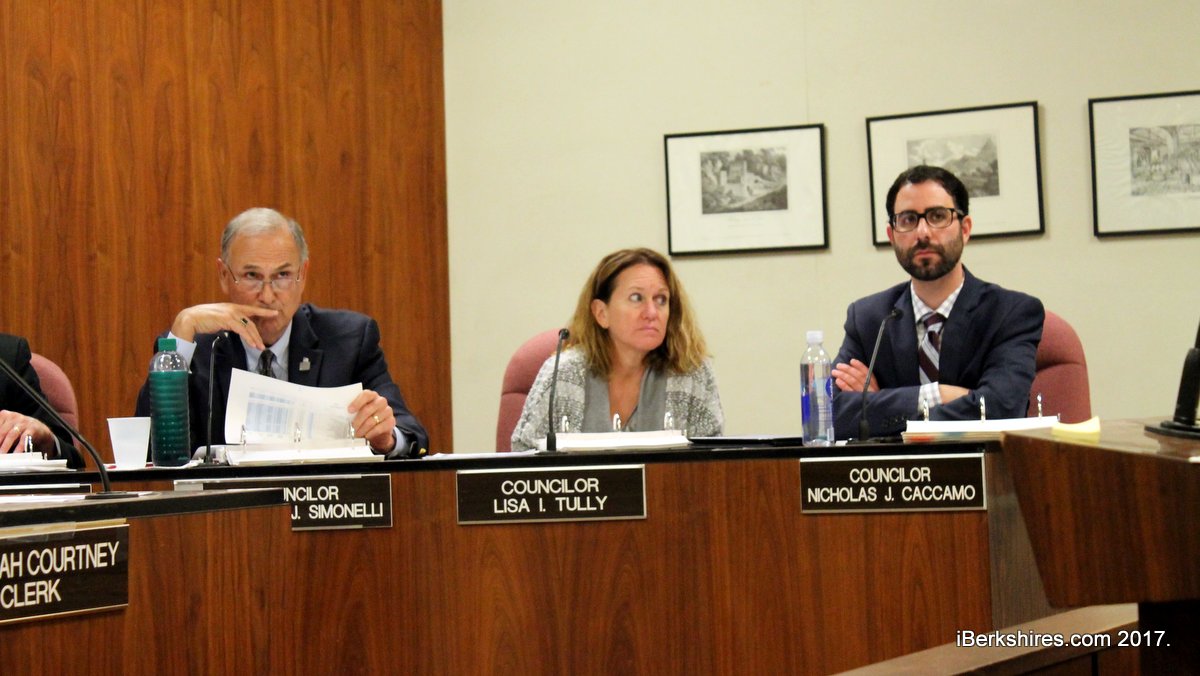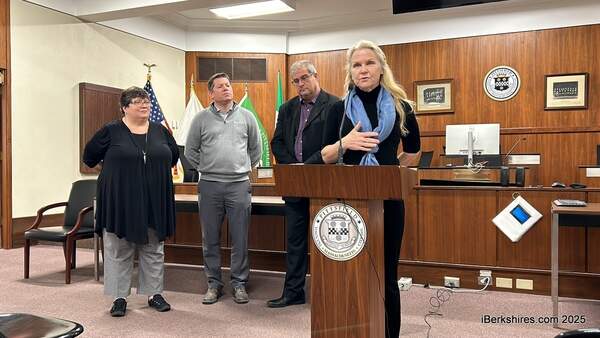Day 1
POSTED: Monday, May 22, 2017, at 11:17 p.m.
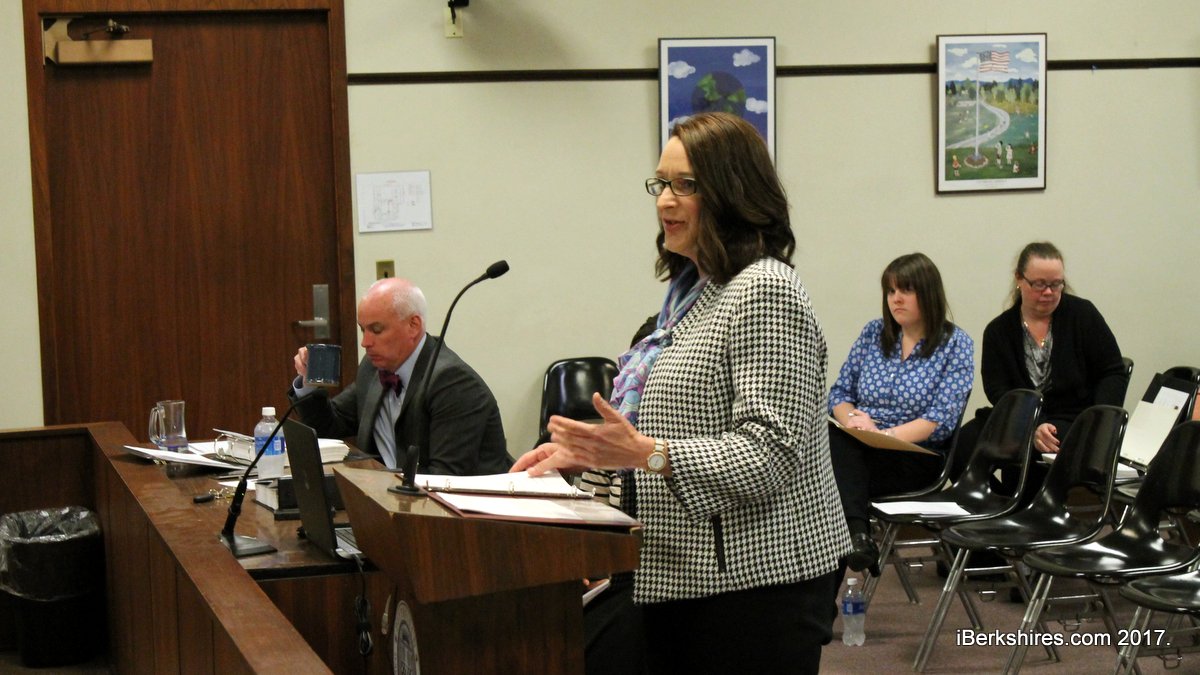
Mayor Linda Tyer said the city is just $37,145 short of the levy ceiling if her proposed budget is passed. DAY 1
PITTSFIELD, Mass. — Mayor Linda Tyer has put forth a $163.8 million budget, which basically puts the city at the levy ceiling.
The budget increase is only 1 percent, with the majority of that going to health insurance, and will leave the city only $37,145 short of the hitting the levy ceiling.
The ceiling is a state restriction on the amount of revenue the city can bring in from property taxes.
"It is important to point out that this constraint has been a decade or more in the making," Mayor Linda Tyer said. "It took us a long time to get here and it is going to take a lot of work to overcome it."
The total spending plan is proposed at $163,859,871, which is $1,693,362 more than last year. However, non-property tax revenues are projected to fall by $1.7 million, so $3.4 million more will come from property taxes.
The operating budget is at $145,191,805, the enterprise budget is at 11,376,495, other expenses are penciled in at 7,291,571.
The city is projecting the need to raise $84,420,700 from property taxes, which will lead to an estimated 80-cent increase on the tax rate for residential and $1.45 for commercial (or $80 per $100,000 of assessed value for residential properties and $145 increase per $100,000 of commercial.)
The mayor said the budget focused on creating safe neighborhoods through investments in police and fire, keeping the public schools "competitive" and maintaining and plowing roads.
But, because of the looming debt ceiling, the budget calls for the reduction of 76 jobs, 70 of which are from the school department, and Tyer said 16 departments are level funded. The school budget is being cut by $250,000, which is leading to the layoffs.
"I am deeply sorry that it has come to this," Tyer said of the employees who will lose their jobs because of the cuts.
The budget is particularly taxed by a 12.9 percent increase in employee health insurance. That accounted for a $3 million increase to the operating budget. Tyer added that there was a $594,239 increase in retirement contributions and $120,034 increase in long-term debt. That accounted for $3.7 of the $3.9 million increase in the operating budget.
Tyer said asking departments to level fund means taking a cut because as contractual increases, such as negotiated salary hikes or insurance, grow, level funding means either reducing staff or cutting in other areas.
"As we move through the years we will have to make more and more difficult decisions and focus on our core services," she said.
This budget does reorganize some departments, she said, hoping to create efficiencies. It will also use $2.2 million in free cash to offset the tax rate increase. The use of those funds had been contentious in the past as the auditors urged city officials against using those one-time revenues to pay for the annual operating budget.
At this point, there is a limit on the amount taxes that can be raised, so if it weren't used for that, the city would have to find an additional $2.2 million in cuts to the budget.
"We have consulted with our auditor Tom Scanlon and he said we have no choice but to use free cash to balance our budget," Tyer said.
The mayor said she hopes to start negotiations with the Public Employees Committee regarding the current 85/15 health insurance split to cut on city expenses, looking to consolidate school custodians into one department, implement a toter trash pickup system, and launch a home improvement program in hopes to grow property values.
"I'm optimistic that we can survive this downturn and thrive," Tyer said.
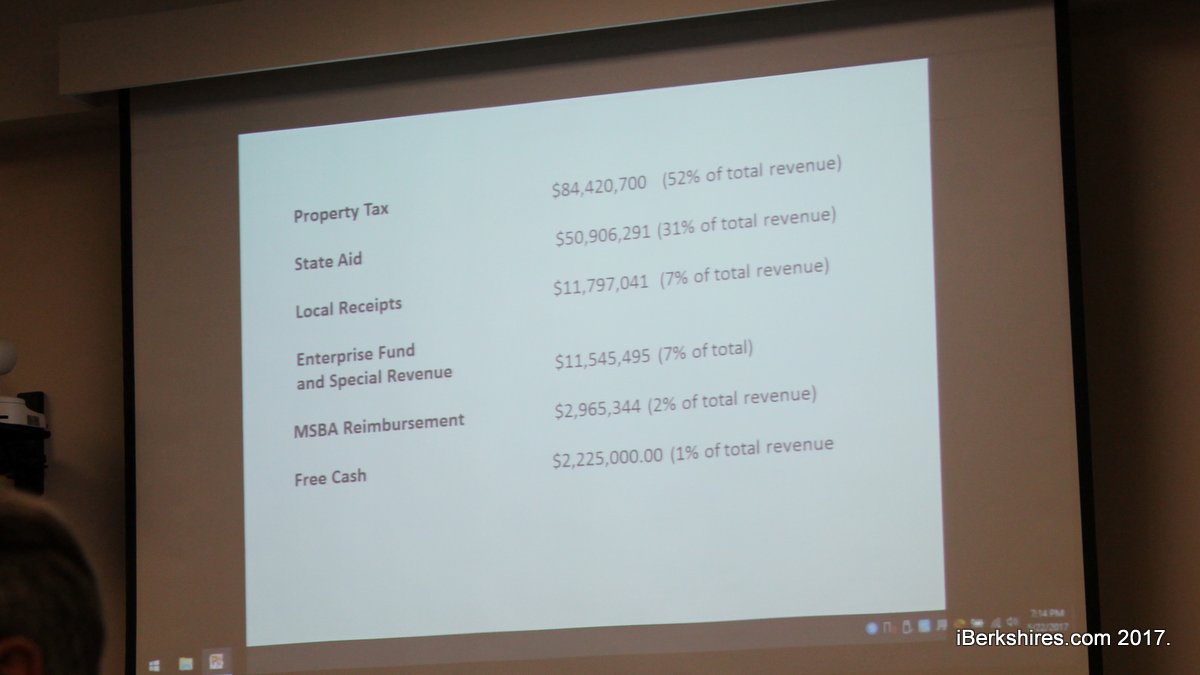
The revenue being used to fund the proposed budget.
PITTSFIELD, Mass. — City Solicitor Richard Dohoney pretty much handcuffed what would have been most of the deliberation among the council on Monday night.
Dohoney said in his legal opinion, the City Council is unable to change salaries for any of the positions in the budget. He said the mayor is the one who sets the step an employee is hired at and does the annual reviews for non-union employees. The union employees are covered by collective bargaining contracts.
The legislative body of the City Council is unable to decrease the pay of any employee.
"That is quite a handcuff on your ability to deal with the budget but that is where your discretion lies," Dohoney said.
That particularly struck Councilor at Large Melissa Mazzeo, who said the city code constantly has "subject to appropriation" after employee pay scales. Further, she said there has to be a way to make sure an employee is getting hired at an appropriate step, and not solely on the mayor's choice.
"I can't accept the fact that we don't have any way to check and balance that," she said.
Nonetheless, the opinion quelled what could have been a lengthy meeting because many of the questions Mazzeo had prepared were based on salaries.
Dohoney also set some other ground rules: the council needs to approve a budget by June 23 or the mayor's proposal will automatically be instated and the council doesn't have the authority to increase a budget, only to ask the mayor for more money for something. The council can decrease a budget but that needs to have an identified line to come from.
"It is my intention to have the budget on the agenda for June 13. If we are not done by June 13, then there will be a special meeting on June 14, June 15, June 16," Council President Peter Marchetti said.
The City Council did have a public hearing, but nobody issued any comment.
The City Council approved the $200,846 budget for the mayor's office with little debate. The budget is exactly $7 less than last year.
Last year, the City Council got into somewhat of a controversial debate over the salary of Director of Administrative Services Roberta McCulloch-Dews. The council had tried to cut the position in half, to a part-time job, and questioned the step she was hired at.
That didn't happen this year. The City Council had already been told by the attorney that they couldn't change salaries.
Councilor at Large Melissa Mazzeo did raise some questions in that the both the director of administrative services and Executive Assistant Catherine Van Bramer were in line for increases of $491 and $627 respectfully. Director of Personnel Michael Taylor said the two completed their first six months on the job when all employees are entitled to step increases. Employees are also eligible for a step raise after a full year. That increase is reflective of what it will take for the full fiscal year depending on when those step changes went into effect.
"It is the step that she got for the six months of completing her services," Taylor said.
The mayor made reductions to the lines for marketing and advertising, supplies, and travel for a total of $1,125 savings, making up for more than the salary increases for the office's two other employees.
Councilor John Krol, however, noticed that for the second year Tyer has been in office, she had denied a raise. But, the City Council had previously adopted a provision that tied the salary to the consumer price index to make sure the salary grew over time without politics being involved.
While he commended the mayor for doing so when the city is facing such difficult financial times, he said, "that defeats the purpose of being tied to the consumer price index."
|
Account Name |
2016 Approval |
2017 Approval |
2018 Approval |
|
Mayor |
$91,540 |
$95,000 |
$95,000 |
|
Director of Admin Services |
$53,095 |
$52,195 |
$52,686 |
|
Executive Assistant |
$38,355 |
$36,658 |
$37,285 |
|
Markets and Advertising |
$2,000 |
$500 |
$250 |
|
Supplies |
$3,500 |
$3.500 |
$3,125 |
|
Travel |
$5,000 |
$2,000 |
$1,500 |
|
MA Municipal Association |
$10,200 |
$11,000 |
$11,000 |
|
Total |
$203,690 |
$200,853 |
$200,846 |
City Council
The City Council's budget is level at $103,892. There was no changes proposed to any of the budget lines.
Ward 4 Councilor Christopher Connell did ask about the marketing and advertising line, saying that as of April 30, the council has just about half of the budget.
"I know it it is a small amount but every little bit adds up," Connell said.
City Clerk Jody Phillips said the money is mostly used for legal ads, and council supplies such as the paper with the council's seal needed to write ordinances.
"It is hard to tell what we will use in a given year," Phillips said.
|
Account Name |
2016 Approval |
2017 Approval |
2018 Approval |
|
Councilors |
$90,002 |
$90,002 |
$90,002 |
|
Clerk of the City Council |
$4,000 |
$4,000 |
$4,000 |
|
Clerk of Committees |
$8,640 |
$8,640 |
$8,640 |
|
Advertising/Marketing |
$1,250 |
$1,250 |
$1,250 |
|
Total |
$103,892 |
$103,892 |
$103,892 |
City Solicitor
The City Council approved the $217,813 budget for the city solicitor without a word.
The city contracts with Donovan & O'Connor for legal services and the entire budget is remaining exactly the same as last year.
|
Account Name |
2016 Approval |
2017 Approval |
2018 Approval |
|
City Solicitor |
$77,472 |
$1 |
$1 |
|
Assistant City Solicitor |
$35,218 |
$1 |
$1 |
|
Executive Legal Secretary |
$39,210 |
$39,011 |
$39,011 |
|
Tax Title Litigation |
$1,500 |
$1,500 |
$1,500 |
|
Supplies |
$1,000 |
$1,000 |
$1,000 |
|
Law Library |
$11,500 |
$11,500 |
$11,500 |
|
Legal Fees and Court Costs |
$60,000 |
$162,000 |
$162,000 |
|
Legal Settlements |
$0 |
$0 |
$0 |
|
Equipment Maintenance |
$2,800 |
$2,800 |
$2,800 |
|
Total |
$228,700 |
$217,813 |
$217,813 |
City Clerk
The city clerk's budget is yet another one remaining flat. The City Council approved the budget at $326,522.
The most notable change in the budget is a 13.5 percent decrease for election officers. The line is being cut by $3,584.
"There were three elections last fiscal year," City Clerk Jody Phillip said, saying there will be fewer this year.
Again, Councilor at Large Melissa Mazzeo questioned the salaries, saying the salaries in the clerk's office are not matching up with the salaries in the city code for steps. That is the opposite of what is being shown in the mayor's budget, where the salaries are not necessarily lined up with the scale.
Director of Personnel Michael Taylor said the difference is that the new employees in the mayor's office had a six-month review, which is done after the date of hire. Throughout the city, there will be various employees gaining a step at different times depending on the hire. Managers and other non-union employees could receive a 1 percent raise on an annual basis, but that would be at the mayor's discretion.
"There are some people who have been here four years and are still step 1," Mazzeo said. "I don't get the disparity."
Taylor said for some employees, the increase is not based on time but on performance. He said there is "not an established protocol" for doing employee reviews. He said the city's administration has developed one internally but hasn't implemented it yet.
|
Account Name |
2016 Approval |
2017 Approval |
2018 Approval |
|
City Clerk |
$65,625 |
$67,264 |
$68,682 |
|
Assistant City Clerk |
$39,090 |
$40,668 |
$43,350 |
|
Head Clerk |
$34,885 |
$36,099 |
$36,634 |
|
Assistant Clerk Registrar |
$36,180 |
$36,483 |
$36,211 |
|
Election Officers |
$34,314 |
$26,516 |
$22,932 |
|
Secretary Board |
$32,550 |
$33,862 |
$31,120 |
|
Senior Clerk Typist |
$26,590 |
$26,980 |
$28,048 |
|
Registrars Board |
$2,400 |
$0 |
$0 |
|
Licensing Board |
$2,950 |
$0 |
$0 |
|
Election Custodians |
$3,600 |
$2,600 |
$2,700 |
|
Equipment Maintenance |
$5,424 |
$6,300 |
$6,300 |
|
Election Programming |
$9,000 |
$5,600 |
$4,936 |
|
Election Rentals |
$1,200 |
$900 |
705 |
|
Education and Training |
$1,000 |
$1,500 |
1,000 |
|
Advertising and Marketing |
$500 |
$500 |
$500 |
|
City Code Updates |
$10,000 |
$10,000 |
$10,000 |
|
Records Preservation |
$2,000 |
$2,000 |
$2,000 |
|
Supplies |
$23,000 |
$13,500 |
$16,404 |
|
Census |
$15,000 |
$15,750 |
$15,000 |
|
Total |
$345,308 |
$326,522 |
$326,522 |
RSVP
The RSVP program will see a budget increase of $454, for a total of $79,045.
That is mostly driven by a $517 increase in salary for the administrative assistant. Memberships and dues also increased by $195. To make up for those increases, RSVP reduced $195 from the volunteer coordinator.
The city's funds are only a portion of the cost the operate the project. The program receives federal funds through the Corporation for National & Community Service to operate the retiree program, getting volunteers to work on community service projects.
"We are like a volunteer clearing house. Non-profits can sign up with us," Director Cheryl Whalen said.
The program is available through Berkshire County, but Whalen said very few outside of Pittsfield use it. She said there have been volunteer placements in Adams and Great Barrington, and volunteers can come from those towns. But, mostly, all involved are from Pittsfield.
"We are supposed to, through the grant, serve all of Berkshire County," Whalen said.
|
Account Name |
2016 Approval |
2017 Approval |
2018 Approval |
|
Director of RSVP |
$34,793 |
$34,984 |
$34,984 |
|
Volunteer Coordinator |
$15,381 |
$15,948 |
$15,753 |
|
Administrative Assistant |
$16,910 |
$18,851 |
$19,638 |
|
Membership and Dues |
$300 |
$1,121 |
$1,253 |
|
Postage |
$400 |
$400 |
$400 |
|
Staff Training |
$457 |
$300 |
$300 |
|
Advertising |
$0 |
$0 |
$0 |
|
Telephone |
$350 |
$6 |
$6 |
|
Supplies |
$1,900 |
$1,500 |
$1,500 |
|
Staff Travel |
$1,000 |
$1,000 |
$1,000 |
|
Volunteer Recognition |
$2,500 |
$2,500 |
$2,500 |
|
Equipment and Copier Lease |
$2,947 |
$1,981 |
$1,981 |
|
Total |
$76,938 |
$78,591 |
$79,045 |
Council on Aging
The Council on Aging is looking at a $500 decrease, bringing its total budget down to $292,652.
The changes to the budget include $283 increase for the senior clerk typist, $335 for the social service technician/custodian and decreases of $618 for temporary labor and $500 for supplies.
The council had little to say about the budget, but Mazzeo again raised concerns with salaries. Mazzeo said the administrative assistant salary hasn't changed. She said the council changed the pay scale in order to make the salaries more competitive when seeking employees and to have it based on merit, and not time.
Yet the scale is seemingly used in a scattered way, she said.
"I think this needs to be really clear," Mazzeo said. "We've really got to bring this in."
|
Account Name |
2016 Approval |
2017 Approval |
2018 Approval |
|
Director |
$52,910 |
$52,910 |
$52,910 |
|
Senior Clerk Typist |
$30,680 |
$30,897 |
$31,180 |
|
SDC Assistant |
$22,935 |
$23,558 |
$23,558 |
|
Soc Serv Tech/Custodian |
$31,440 |
$31,665 |
$32,000 |
|
Soc Serv Tech/Custodian (PT) |
$25,280 |
$25,377 |
$25,377 |
|
Program Assistant |
$32,125 |
$32,125 |
$32,125 |
|
Activities Leaders (PT) |
$21,545 |
$21,545 |
$21,545 |
|
Kitchen Coordinator |
$22,490 |
$22,490 |
$22,490 |
|
Temp. Labor |
$4,000 |
$4,000 |
$0 |
|
Equipment Maintenance |
$6,435 |
$6,435 |
$6,435 |
|
Building Maintenance |
$13,500 |
$13,500 |
$13,500 |
|
Printing |
$1,300 |
$1,300 |
$1,300 |
|
Supplies |
$3,000 |
$3,000 |
$2,500 |
|
Program Expense |
$24,350 |
$24,350 |
$24,350 |
|
Total |
$291,990 |
$293,152 |
$292,652 |
Veterans Services
The veterans services account is proposed to see a $6,555 budget cut, placing the total budget at $1,081,853.
The majority of the budget is for the programs at $1 million, most of that is reimbursed by the state. Veterans Services Officer James Clark said when he first took the job, there was an increasing number of people needing benefits and that threw the city's financing out of balance. But since then, the number of veterans receiving benefits has leveled out at around 180.
"Over the last two years, it is almost a match year after year," Clark said.
The majority of the work is "a public assistance program for low-income veterans." Clark said the veterans receiving the benefits are getting them as a "bridge" to when they can receive benefits from the Department of Veterans Affairs or have a job to be self-sustainable. About half of those receiving benefits are retired, he said.
The mayor had asked all department heads to make cuts if possible and Clark's budget was cut in a few areas - flags and rental expenses.
Clark said the city is required to place flags at the graves of veterans, but that is paid for by the state. The city has been contributing to that to purchase bronze markers for the graves as well. The city had $2,000 allocated for those but is cutting that line.
Clark said the markers "keep disappearing," and often end up being pawned at scrapyards. The city had to move from bronze to aluminum.
"They are disappearing on a regular basis. We went to an aluminum marker," Clark said.
The department will now seek to raise funds for those aluminum markers on its own instead of leaning on the city budget. The department also cut rental expenses by $6,700. Clark said that line was used to contribute to other veterans agencies but that the city wasn't obligated to do so.
|
Account Name |
2016 Approval |
2017 Approval |
2018 Approval |
|
Veterans' Agent |
$48,100 |
$48,100 |
$48,100 |
|
Administrative Assistant |
$27,235 |
$28,333 |
$29,478 |
|
Temporary Labor |
$0 |
$0 |
$0 |
|
Equipment Maintenance |
$650 |
$975 |
$975 |
|
Rental Expense |
$6,700 |
$6,700 |
$0 |
|
Education and Training |
$0 |
$0 |
$0 |
|
Flags |
$2,000 |
$2,000 |
$0 |
|
Supplies |
$2,000 |
$2,000 |
$3,000 |
|
Program Expense |
$1,000,000 |
$1,000,000 |
$1,000,000 |
|
Award and Declarations |
$300 |
$300 |
$300 |
|
Total |
$1,086,985 |
$1,088,456 |
$1,081,853 |
Cultural Development
.JPG)
Director of Cultural Development detailed other sources of revenue which help fund the programs the office administers.
The office of cultural development is proposed to see a $1,606 decrease in the budget, ending at $104,585.
Council Vice President John Krol said the department brings more back to the city than it costs.
Director of Cultural Development Jen Glockner said Third Thursday operates outside of the budget, the 10x10 arts festival is paid through sponsors, the Mastheads project is covered by a National Endowment for the Arts grant, and other programming is paid for by the Massachusetts Cultural Council.
Additionally, the department rents some nine studio spaces to artists, which brings in about $15,000 to the city's general fund every year.
"We're still seeing at least a dollar for dollar payback," Krol said
The most notable work out of the department is Third Thursday, which is paid by vendor fees and sponsors.
"We raise the money and then spend the money on these events," Glockner said.
The decreases are seen in the budget from $1,000 in contractual services, and $500 from both supplies and travel. Those reductions are offset by a $394 increase for the administrative assistant.
|
Account Name |
2016 Approval |
2017 Approval |
2018 Approval |
|
Director |
$52,910 |
$52,910 |
$52,910 |
|
Administrative Assistant |
$20,480 |
$29,981 |
$30,375 |
|
Tourism Administrator |
$13,240 |
$0 |
$0 |
|
Building Maintenance |
$0 |
$0 |
$0 |
|
Contractual Services |
$4,000 |
$5,000 |
$4,000 |
|
Tourism Expenses |
$12,000 |
$12,000 |
$12,000 |
|
Visitor Center Expenses |
$1,000 |
$500 |
$500 |
|
Supplies |
$3,500 |
$3,500 |
$3,000 |
|
Telephone |
$800 |
$800 |
$800 |
|
Travel and Dues |
$1,500 |
$1,500 |
$1,000 |
|
Equipment Building |
$0 |
$0 |
$0 |
|
Total |
$109,430 |
$106,191 |
$104,585 |
Day 2
POSTED: Thursday, May 25, 2017, at 11:37 p.m.
School Department
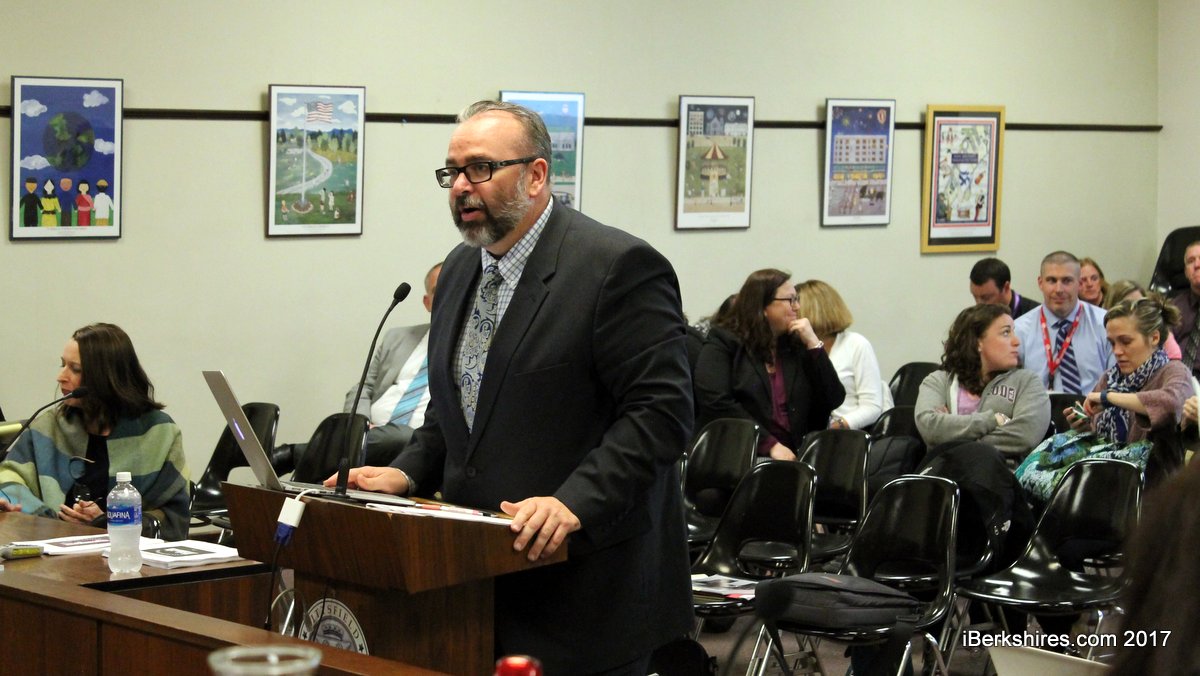
Superintendent Jason McCandless stood before the City Council for three hours on Thursday presenting the budget, and fielding the councilor's questions.
PITTSFIELD, Mass. — Despite a school budget calling for some 68 job reductions, the City Council exuded confidence in the budget Superintendent Jason McCandless put before them on Thursday.
The council gave its preliminary approval to the $60,066,338 city appropriation to operate the school district. The district is adding $620,000 in tuition and school choice revenue for a total spending plan of $60,686,338.
The city doesn't really have much choice when it comes to saving jobs because the entire proposed city budget brings it about $37,000 under the levy ceiling.
Nonetheless, the council felt the School Committee and staff did the best they could with the limited resources available.
"The only silver lining, if there can be a silver lining in such a grave and dire cloud, is that we've worked really hard to do this work strategically," McCandless said.
The superintendent said in order to provide the exact same service with the exact same staffing as this current year, the district would need to have raised its budget by some $2.5 million. But, Mayor Linda Tyer had put out a directive to all departments
to level fund the budget.
"We believe we've done our due diligence to follow the mayor's directive to craft a level-funded budget," School Committee Chairwoman Katherine Yon said.
The city then got word of a $3 million increase in health insurance costs, eating up most of what was left in levy capacity. Tyer put out another call to action, asking departments to cut what they could. The School Department had previously eyed 73.5 reductions, and then
cut an additional $250,000 from the level-funded budget, upping the job loss to 75.65 full-time equivalent jobs.
The United Educators of Pittsfield voted to forego a half a year's worth of step increases, shifting $300,000 toward keeping additional teachers in the classroom.
"I do appreciate the union's taking that action. I do think going forward, these are realities we are all really starting to come to grasp with," Councilor at Large Melissa Mazzeo said.
In response, the School Committee cut a line for curriculum development, which McCandless stood firm on, to save some more jobs. State Sen. Adam Hinds and state Rep. Tricia Farley-Bouvier each put in state budget amendments to save two pre-kindergarten classes — though those funds still need to be secured throughout the remainder of the legislative process.
"We indeed proved that we all in this together," Yon said.
Now the job loss is looking to be about 68 and the superintendent says most of them are people who retired or left the job and the city won't rehire the position. The reduced positions are 18 teachers, or five percent of the total teaching staff, 37 paraprofessionals, 15 percent of that pool of workers, and three positions from the Mercer Building, though not necessarily administrators.
"This budget is incredibly painful on a personal and professional level," McCandless said.
The staff reductions were done in ways McCandless said "insulates" the students from truly noticing a difference in the education delivered.
"There are absolutely things we will miss next year deeply," McCandless said. "We did our best to insulate kids from these cuts."
McCandless doesn't have much optimism that future budgets will be much different. The only way to raise the property tax revenue would be through large, casino-sized private investment, which the city can't count on immediately. He doesn't think the state's support through Chapter 70 is going to increase much in the coming years. And federal dollars are "questionable."
"We anticipate this budget situation will be in the neighborhood of dire for the next five years," McCandless said.
That's when some of the more impactful budget cuts will come, he said. One of those cost-cutting measures will be looking at closing a school. The budget approved by the council on Thursday includes some $25,000 to perform a close analysis of the future of the school buildings.
That is supported by enrollment trends as well, not just financially. McCandless said since 2007 the district's enrollment dropped by 926 students. Projections for the next 10 years show a drop from 5,416 students to 4,523, another 900 or so.
"We know we are going to have to look seriously at closing schools," McCandless said.
Despite enrollment trends, McCandless said the FY18 budget is more aggressive in reductions than just sizing appropriately.
Yet, Pittsfield is not alone in facing school funding issues and McCandless painted a picture of the current state of the school's system to show there isn't anything particularly out of place in how it uses funds.
The district is below state average when it comes to the number of teachers per 100 students and in the bottom 20 percent in the state for average teacher salaries. The number of administrators in the office dropped in the last four years from 71.5 to 58, a 19 percent decline. In the same four years, the state average increased by 5 percent.
"When we start having to make reductions, I start at the level I reside closest to on the organizational chart and we work down from there," McCandless said.
Pittsfield spends $328 per student on administration, which is the lowest compared to similar urban districts, he said. And the school is close to the lowest in how much is spent on principals per student.
Overall, the district averages $14,450 per student, which is the third lowest in Berkshire County behind Savoy and Adams-Cheshire. And below the state average.
"Communities that have enough income and enough property value to spend 16, 17, 18, 19 thousand it surprises nobody that they tend to be the highest performing districts," McCandless said.
And Pittsfield faces challenges other districts don't. The district doesn't match the enrollment of the largest cities in the Commonwealth, but it fairly large compared to the state average. The city has higher than average percentages of students with high needs. There is a much greater percentage of economically disadvantages students than the state, above average English Language Learners percentage, and well above the state average with students with disabilities.
Despite those demographics, McCandless highlighted some of the success the district has had in recent years. The district is in the top 15 of the 175 public and charter high schools in the state when it comes to students taking three or more AP tests. The schools are in the top 20 with the number of high needs students taking the exams, top 25 for economically disadvantages, and top 20 for black students. The school has the 14th best pass rate among students with special needs.
Between September and May of the 2012-2013 school year, students were suspended for a total of 1,237 days. This year, in the same months, there were 386 days. The four-year student dropout rate is at a 10-year low with 1.9 percent. Just two years ago, the budget debate centered on the additional of behavior technician jobs that McCandless defended hotly in the face of some councilors looking to cut them.
"That is not by accident. That is not just a blip on the radar," McCandless said.
This year, Williams Elementary became a Level 1 school, making the third school in the district to receive the state's top designation. Taconic was recognized as a silver medal school by U.S. News and World Report. Pittsfield High School is the only school in Western Massachusetts to have a bilingual graduation program, providing a nationally recognized seal for students being proficient in multiple languages.
McCandless said all that won't go to waste with the next budget. The spending plan also includes adding new courses, aligning the K-8 mathematic curriculum, bringing the teaching materials up to date and aligning with state standards.
The budget seeks to find a balance in what was reduced but with 84 percent of the budget spent on personnel, there was little "stuff" to cut.
"We have no other choice but to cut employees," McCandless said. "We could have dark cold buildings with nothing in them but be OK with staffing levels, but that's not fair to the kids."
The budget was crafted through a series of filters. First, the administration asked if it was something the state legally required the district to provide. Preschool is not, which is why four classes of that were cut — and two eyed to be brought back with the state budget.
Then they asked if they are morally obligated to do it. Does the community expect it? The budget protects theater, sports, and foreign languages which taxpayers expect for their money.
Then the district looked for data to find things that may not be actually helping the students gain proficiency. McCandless said there are programs the district loves but without the data to support it, the district cuts it. And finally, the district sought out community partners. For kindergarten, for example, the district has reached out to other providers such as head start to bring them into the same school to provide the service.
"We have lots of partners in this community who are able to do some of the same things we are able to do. And we want to work with them and not trying our own programs that they can be doing better," McCandless said.
Despite praise for the budget school staff crafted, the councilors did pose some questions. Council Vice President John Krol questioned cuts to the Crosby's special education program.
McCandless responded that the preschool students are there four days a week and the last day was used for "bureaucratic" functions like filing state reports and documentation for parents. The teachers will still do that, but having paraprofessionals there on the fifth day was "a luxury" the department can no longer afford.
As for cuts to the resource room, McCandless said there will be fewer adults in the classroom — instead of two or three adults, there will only be a teacher with up to a dozen students.
"We will not violate any IEPs, which are legal documents," McCandless said.
Krol also voiced concern over the reduction of two preschool programs.
"For me, I've always believed if we could have a 3-year-old program for every child in the city, that would be ideal," Krol said.
McCandless agreed with the importance of early education and cited that as one area where working with community partners comes into play.
The reduction of a truancy officer also raised concerns, as it had with the School Committee.
"Nobody is happy with that," McCandless said, but the return on the investment didn't seem to make the position valuable enough to keep in the budget compared to other jobs.
That work will be split among existing staff members, he said. But Ward 7 Councilor Anthony Simonelli doubted it would have as much of an impact in ensuring students are going to school.
"We know that truancy and getting the kids to school is a major priority," Simonelli said. "If you split this position into three different people, then it won't work."
Krol suggested trying to find a way to add money to the budget to bring it back but ultimately did not make any motion to do so.
Ward 3 Councilor Nicholas Caccamo voiced concern with the elimination of an assistant superintendent for career and technical education. Richard Brady, who currently has that job, is retiring and Caccamo says with a new Taconic High School opening, there should be somebody overseeing the vocational programs.
McCandless said the district had looked to hire a replacement but those interested were too pricey to bring to the city. Instead, that job is being merged with another. Further, he said he is not convinced that the workload is enough for a superintendency level job.
Simonelli questioned the addition of a vice principal at PHS, saying by not adding that position, more teaching or paraprofessional jobs could be saved. McCandless said PHS has a high number of students with special needs, economically disadvantaged, and English Language Learners. The school's location and layout provide additional oversight challenges for principals. He says it is vital to have somebody helping keep the educational program on track.
"There are challenges at PHS that I think make it a much more nuance school that people think," McCandless said.
Simonelli responded that it was the job of the principal, which McCandless said it is, but it is too big of a job for one person. Simonelli also questioned the substitute teacher budget, which is showing a surplus this year but yet the proposed budget remains at $625,000.
Assistant Superintendent of Business and Finance Kristen Behnke said, "this is one of our more volatile accounts." While this year the district struggled to get substitutes in, she said in other years that has trended as high as $800,000.
"It is one I don't want to artificially keep low," she said.
Simonelli questioned $100,000 for professional development, which is the same as last year despite job reductions. Behnke said that number is contracted with the teachers' union and not based on the number of teachers. Simonelli also asked about moving the Adult Learning Center to a city-owned building instead of leasing, which McCandless said will be considered when the lease expires.
"When we get closer to the lease expiring, and my recollection is we have another year or two, we will look at other options," McCandless said.
Another cut worrying the principals and the teachers' union is the reduction of team leaders and department heads, stipends for teachers in the middle and high school.
Councilor at Large Peter White praised the superintendent and deputy superintendent for not taking pay raises again this year. They haven't taken those raises in a number of years. White also praised the $300,000 the teachers are giving up to help balance the budget.
Ward 2 Councilor Kevin Morandi questioned a 21.6 percent cut to equipment maintenance. Behnke responded that is a line she is unsure about but was cut as the district sought places to reduce. She'll monitor it but said this year the line was used more heavily than before for a security camera project at Herberg Middle School.
The City Council also pushed for more marketing to turn the school choice numbers around. This year, 101 students choiced in, bringing $593,000 to the district. However, 506 choiced out, taking $2,874,255 with them. The councilors said those numbers aren't a reflection of poor schools but a poor perception of the city schools.
"We still have such a school system that offers something for every student, at whatever level, wherever they are," Councilor at Large Kathleen Amuso said.
Krol suggested working harder at marketing because schools like Berkshire Arts and Technology Public Charter School are "aggressively targeting our students." He suggested social media and working with Pittsfield Community Television to reach out to more people.
"I think it is time to challenge our residents a little bit more and ask them why in the world would they send their students anywhere else?" Krol said.
Caccamo said one problem is that the city schools are often not even being considered in the first place. McCandless had given him data that shows there is a gap of about 100 children between the number of births in a given year versus the number attending the schools five years later. McCandless added that there are more than 200 families in the city who choose to home school.
Day 3
POSTED: Tuesday, May 30, 2017 at 10:42 p.m
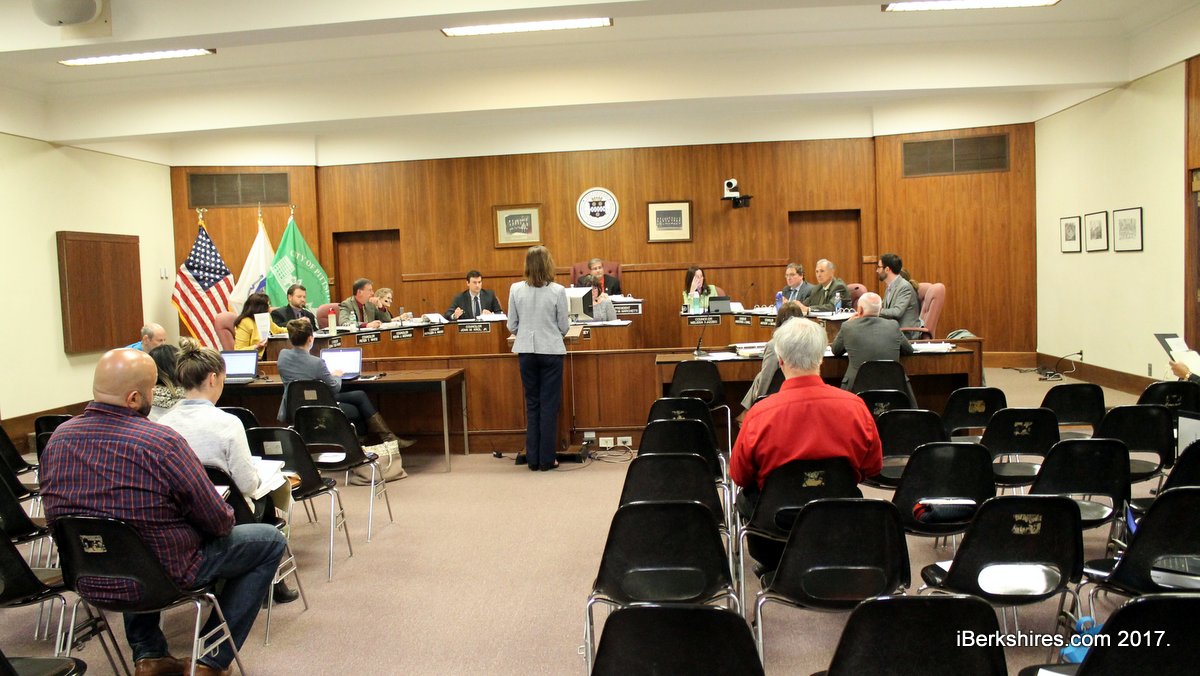
The City Council asked department heads on Tuesday about the budget for some two hours and 15 minutes, but the Council only changed the figure for one budget line.
PITTSFIELD, Mass. — The City Council made its first change to Mayor Linda Tyer's proposed budget on the third day of the council's review.
But it was not of much significance as the $5,000 reduction to one line item on Tuesday is a minuscule percentage of the $163.8 million spending plan.
More than half way through the budget review process, the council hasn't even attempted to change the mayor's proposal except for cutting $5,000 more from the city physician line in the Personnel Department budget, which was done by a split 6-5 vote on Tuesday.
The majority of the department budgets are level funded or below funded, leaving little to be reduced from the council's budget last year, and the levy ceiling leaves little for the council to work with to raise appropriations.
That has thus far led to a very tame round of budget hearings compared to the last couple of years. Last year, the council debated more than four hours each night, often times longer, debating line by line. This year, the longest meeting has taken about three hours.
While the budget wasn't changed dramatically on Tuesday, the council did spend more than two hours questioning how departments use the funds. The council approved budgets for the Building Inspectors, Personnel, Health Department, Police, Fire, and Emergency Management.
iBerkshires has been detailing the extent of the discussion for each budget, which you can find below.
Building Inspectors
The building inspectors' budget was approved at $369,892, which is $14,866 lower than last year — or 3.9 percent. That reduction mostly came with the elimination of a senior clerk position, a position Building Commissioner Gerald Garner says he isn't sure how to replace.
"I'm still working on we are going to eliminate that position," Garner said in response to a question from Councilor at Large Melissa Mazzeo asking what the impacts will be.
Garner said the clerk headed the CFI and R2 inspections (fire inspections for public assembly places and for multi-family dwellings). The clerk also oversees liquor licenses.
"She does all of the data collection for that plus the liquor licenses. That sounds easy but it's not," Garner said, adding that he cut it because it was the only way to cover the contractual raises for other employees while still fitting the mayor's directive to cut costs.
The position collects the data, follows up on licenses, sends violation notices, sets up inspections, follows up with businesses and property owners about compliance issues, and is responsible for rescinding licenses if compliances aren't met.
"I don't love the idea of cutting this, to be honest with you," Ward 3 Councilor Nicholas Caccamo said.
When asked directly from Ward 4 Councilor Christopher Connell about whether the loss of the position will result in the department creating less revenue, Garner said it would. Connell said the department has brought in some $462,000 in revenue already. He would like to see the position brought back in the future if revenues start decreasing.
"If a position is going to pay for itself and then some, is that something you'd consider in the future?" Connell asked Tyer.
Tyer couldn't commit exactly, saying there is more under consideration than just the revenue. She said if the city somehow has more revenue to spend in the future, it would be a consideration.
The City Council also found a mistake in the budget document. The numbers for last year showed a $3,000 budget line for temporary labor, which is now proposed at $6,000. The council started to question the increase, except the number was wrong. Last year, the budget was $7,500 and is being cut to $6,000, not increased by $3,000.
The error caused concern for Councilor at Large Kathleen Amuso, who said now she can't be sure there aren't other mistakes.
"I have to be secure that what I am voting on is correct," Amuso said.
Director of Finance Matthew Kerwood said he will double check all of the numbers.
|
Account Name |
2016 Approval |
2017 Approval |
2018 Approval |
|
Senior Wire Inspector |
$49,075 |
$50,851 |
$52,835 |
|
Building Commissioner |
$64,025 |
$64,022 |
$64,022 |
|
Head Clerk |
$30,975 |
$32,103 |
$33,525 |
|
Senior Clerk |
$25,935 |
$26,877 |
$0 |
|
Building Inspectors |
$136,750 |
$143,888 |
$149,205 |
|
Plumbing and Gas Inspector |
$45,555 |
$47,217 |
$49,305 |
|
Temporary Labor |
$7,500 |
$7,500 |
$6,000 |
|
Insurance Deductible |
$500 |
$0 |
$0 |
|
Uniforms |
$1,500 |
$1,500 |
$1,500 |
|
Telephone |
$3,500 |
$3,500 |
$3,500 |
|
Supplies |
$7,500 |
$11,300 |
$10,000 |
|
Total |
$372,815 |
$388,758 |
$369,892 |
Personnel
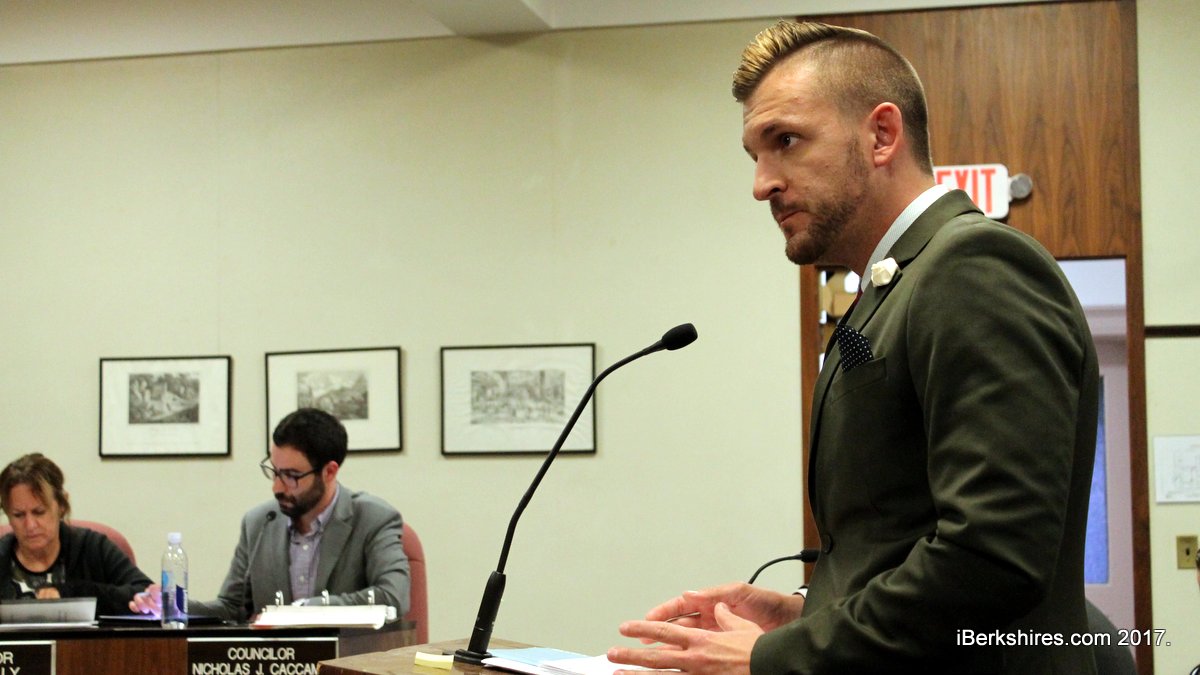
Director of Personnel Michael Taylor's budget was the only one to be changed by the City Council so far.
The Personnel Department saw the first budget change in the City Council's review, with a $5,000 reduction to the city physician line. The budget was approved at $199,322, which is $30,475 less than last year.
The majority of the council's conversation focused on the use of assessment centers beginning next fiscal year for positions in the police and fire department.
The new line item calls for $26,000 to be spent on running those, which is a Civil Service process above the standard written test. The centers bring in consultants in the field to run the potential candidates for high-level jobs in the two departments through a series of exercises to gauge performance.
"It gets, I would say, a better quality candidate as opposed to us using the standard Civil Service process," Director of Personnel Michael Taylor said.
The centers cost $6,500 per test and will be used for certain positions. Using the centers was recommended a few years ago by a study committee, which looked at the possibility of leaving Civil Service altogether.
"I am really pleased we decided to keep in Civil Service. I think it keeps a political agenda out of the way. I also feel we are getting the most well-rounded candidate by going to an assessment center," Ward 2 Councilor Kevin Morandi said.
Ward 5 Councilor Donna Todd Rivers asked about the online application program. Taylor said the program goes beyond posting jobs and accepting candidates but also can be used to run reports on where candidates are coming from to help direct advertising funds, directors jobs to post on social media sites and with job sites. He said thousands of candidates have used the system to apply for jobs within the city.
"It cuts down a lot of different internal procedures in terms of hiring," Taylor said.
Connell motioned for the reduction in city physician line. He said there is still $23,000 left from last year's budget of $60,000 and he doesn't expect it to be used.
"Even if you factor in a 10 percent back into that number, I still think we can go down on this number by $5,000 or $10,000 and still make it," Connell said.
That line was increased last year because the city was expecting to hire more police officers, which it did. The physician line pays for physicals for public safety employees, for drug screenings, and for other exams needed for employees.
"It is probably one of my more unpredictable items," Taylor said. "Depending on our turnover in any given year, it can go over or be under."
The line was reduced with Rivers, Morandi, Mazzeo, Connell, Ward 7 Councilor Anthony Simonelli, and Ward 1 Councilor Lisa Tully in favor of the reduction.
|
Account Name |
2016 Approval |
2017 Approval |
2018 Approval |
|
Director of Personnel |
$64,025 |
$64,022 |
$65,632 |
|
Personnel Technician |
$35,265 |
$35,675 |
$38,099 |
|
Personnel Specialist |
$35,420 |
$0 |
$0 |
|
Training |
$3,000 |
$4,500 |
$4,500 |
|
Educational Opportunity |
$3,000 |
$4,500 |
$4,500 |
|
City Physician |
$40,500 |
$60,000 |
$50,000 |
|
Online Application Program |
$4,800 |
$5,600 |
$5,600 |
|
Advertising |
$2,500 |
$2,500 |
$2,000 |
|
Postage |
$85,850 |
$50,000 |
$0 |
|
Supplies |
$3,000 |
$3,000 |
$3,000 |
|
Assessment Centers |
$0 |
$0 |
$26,000 |
|
Total |
$277,360 |
$229,797 |
$204,322 |
Health Department
The Health Department budget was approved at $456,795, which is a $15,404 increase — or 3.5 percent increase. It is the only budget so far to see an increase.
The majority of that increase is for personnel, particularly with the nuisance control officer and administrative assistant. Health Director Gina Armstrong said the during the contract negotiations three workers were upgraded to higher job classifications. Both positions received a 12 percent increase — from $26,266 to $29,266 for the administrative assistant and from $29,703 to $33,279 for the nuisance control officer
Part of those negotiations also gave the nuisance control officer a $300 stipend for uniforms, making four employees in the department having those and raising the budget by one stipend.
Connell questioned the code enforcement line, saying that there is still $3,500 from last year's budget unspent with limited time left. He felt the budget line, which had been proposed to be cut from $6,000 to $4,300 already, could have gone down even further.
"It still seems like there is some meat on the bones there," Connell said.
Armstrong said it is a volatile line item because it isn't known the extent of a code enforcement order. She said there have been years with a significant amount of public notices, or years with vacate orders requiring the department to make housing efforts. Armstrong had asked for a $4,000, which was a $2,000 reduction from last year.
"In my recommendation, I kind of brought it to the middle based on past years' experience," Armstrong said.
Morandi questioned the difference between what Armstrong asked for property demolitions — $100,000 — and what the mayor put forth in her budget — $25,000.
"We have an extensive list of vacant properties and we also have a short list of those properties slated for demolition," Armstrong said.
The $25,000 budget marker is the same as last year, but that was only after a debate on the City Council floor. Last year, Tyer had attempted to boost that account but was rebuked by the council.
Armstrong said there is a team of city workers meeting monthly to discuss demolitions. They have determined action against a number of vacant properties.
"We have seven on the list and it really depends on the hazardous materials, how many we go to bid grouped together, and size," Armstrong said of how much the $25,000 will accomplish.
The Department of Community Development also used federal funding to take out blighted properties. Connell said he'd like to see more receivership programs instead. Many city properties are too small to build on now without a special variance, so he'd rather see those homes be restored and put on the tax rolls than left vacant land.
"I hate taking a building down that could be salvaged," Connell said. "We always talk about new growth and this is growth we have but we haven't been getting the tax revenue because it is vacant. But if we take it down, then we will never get it."
|
Account Name |
2016 Approval |
2017 Approval |
2018 Approval |
|
Board of Health Director |
$55,945 |
$64,023 |
$64,023 |
|
Senior Sanitarian |
$45,584 |
$45,880 |
$46,918 |
|
Inspector of Weights and Measures |
$0 |
$0 |
$0 |
|
Animal Inspector |
$4,500 |
$4,500 |
$4,500 |
|
Sanitarians |
$75,967 |
$79,725 |
$83,565 |
|
Senior Code Enforcement Inspector |
$43,190 |
$44,760 |
$46,918 |
|
Nuisance Control Officer |
$29,379 |
$29,703 |
$33,279 |
|
Officer Manager |
$31,626 |
$32,780 |
$34,956 |
|
Public Health Nurse |
$41,001 |
$49,300 |
$48,920 |
|
Administrative Assistant |
$25,578 |
$26,120 |
$29,266 |
|
Board of Health Clerk |
$1,500 |
$1,500 |
$1,500 |
|
Water Testing |
$1,200 |
$1,200 |
$1,200 |
|
Uniforms |
$1,500 |
$900 |
$1,200 |
|
Contractual Services |
$2,000 |
$1,000 |
$1,000 |
|
Telephone |
$3,450 |
$3,450 |
$3,450 |
|
Equipment Maintenance |
$4,500 |
$4,500 |
$4,500 |
|
Education and Training |
$3,000 |
$3,000 |
$3,000 |
|
Nuisance Abatement |
$6,000 |
$7,000 |
$10,000 |
|
Code Enforcement |
$0 |
$6,000 |
$4,300 |
|
Advertising |
$3,500 |
$300 |
$300 |
|
Property Demolitions |
$25,000 |
$25,000 |
$25,000 |
|
Medical Supplies |
$0 |
$8,750 |
$7,000 |
|
Supplies |
$7,000 |
$2,000
|
$2,000 |
|
Total |
$431,674 |
$441,391 |
$456,795 |
Police
The Police Department took the most time on Tuesday night, but nothing was changed to the proposed $9,800,049 budget. That is a decrease of $20,725, which is .2 percent.
An annual issue during budgeting with the department is overtime spending. Chief Michael Wynn says the department is annually underfunded and at the end of every fiscal year, the city transfers money from other departments to cover the deficit.
Council Vice President John Krol asked if those numbers should change, though the numbers weren't changed in the budget, with the addition of new officers.
Wynn said this year there was a net gain of 15 staff members, and ideally that will help "attack those overtime numbers," But so far, those officers came on late and needed to go to field training, which upped the use of overtime because the department was essentially paying two officers to count as one.
However, Wynn said the department's staffing hasn't actually increased much. Of the 99 positions the department has authorized, only 91 of them were filled. There are also employees out on injury or other reasons, dropping the active number of officers to 87.
"We are really about where we were last year despite adding 14 bodies," Wynn said.
Because of the Civil Service schedule and availability of qualified candidates, the department can't hire even if it wanted to. The department struggled to get candidates during the last two rounds of hiring and the next Civil Service test isn't until the fall, and the academy would follow that.
"I can't hire any police officers right now so if I have attrition or retirements, that number will go down," Wynn said.
The major driver of the overtime use is when there are too few patrol officers to hit minimum standards for staffing levels during a shift. That's when others are called in to help on overtime.
Special events overtime, however, is a different account and is used to fund the additional detail at events such as Third Thursday. That line is showing a 16 percent decrease.
Simonelli asked about the addition of a crime analyst hired several years ago. Wynn said the analyst is remaining very active within the department and has been making an impact.
Connell questioned a line for dispatchers, saying the year-to-date expenditure were low. He wondered if the difference between actual spent and the budget could be spent elsewhere.
Wynn said he answers that question from somebody every year. The department receives grants to operate the 911 system and uses that money to offset dispatcher salaries. But the department still has to fund those salaries at the full amount. He said the money is typically moved at the end of the year, providing the grant funds are awarded.
Mazzeo questioned the use of school resource officers. Wynn said the department was down one officer this last year, the one for Taconic High School, and has been waiting until the current trainees are in the patrol unit before hiring a new one. Taconic was covered by two patrol officers instead.
Mazzeo, however, felt that there should have been an officer dedicated to the high school.
"I feel the high schools need a resource officer more than the middle school," Mazzeo said.
Wynn said the job is one "where the person becomes the position." It takes a long time for the officer to build a relationship with the students so by pulling a middle school SRO would be just as effective for Taconic as the two new faces from patrol.
"School resource officers become part of the fabric of their school," Wynn said.
Mazzeo, as she mentioned last year, also asked about changing the shift schedules of detectives to reduce overtime. She said detectives are needed more on a Saturday or Sunday than on other days, so that could reduce the number of detectives being called in. Wynn disagreed, saying the only way to decrease the number of hours detectives are called in on overtime is to hire more detectives.
Mazzeo also questioned the funds for ShotSpotter. That is being paid for by private donations so far, according to Kerwood, and that money is kept in its own account for that purpose.
"It is not a raise and appropriate expenses. It is outside of the budget. At this point, this program is being paid for completely through donations," Kerwood said.
Mazzeo would still like to know the account balances for the various donations. Wynn said he has a number of donation accounts, some with a small amount remaining. The department once did a fundraiser to cover health bills of a K9 and that has a small remainder in it.
Kerwood said he is currently in the process of reviewing those donation accounts and calling donors for old donations and see if they want their money back, or to donate it elsewhere. Unless the donor says it can be spent on something else, the city can't touch it.
"If something goes unspent, and goes unspent for years we just roll it over every year," Kerwood said.
|
Account Name |
2016 Approval |
2017 Approval |
2018 Approval |
|
Police Chief |
$115,000 |
$115,000 |
$115,000 |
|
Police Captains |
$248,262 |
$251,062 |
$251,062 |
|
Police Lieutenants |
$384,362 |
$398,965 |
$405,734 |
|
Police Sergeants |
$724,849 |
$872,117 |
$872,117 |
|
Safety Officer |
$65,703 |
$66,414 |
$66,414 |
|
Detectives |
$451,356 |
$516,140 |
$516,140 |
|
Patrol Officers |
$3,356,910 |
$3,720,166 |
$3,720,166 |
|
Mechanic |
$48,100 |
$48,100 |
$49,662 |
|
Drug Enforcement |
$140,315 |
$180,000 |
$225,000 |
|
Dispatchers |
$523,680 |
$523,680 |
$523,680 |
|
Animal Control Officer |
$58,460 |
$58,460 |
$62,542 |
|
Special Response Team |
$12,000 |
$15,000 |
$15,000 |
|
Custodian |
$31,490 |
$35,306 |
$37,818 |
|
Sr. Clerk Typist/Conf. |
$115,718 |
$116,357 |
$116,668 |
|
Senior Clerk Typist |
$68,926 |
$68,926 |
$70,256 |
|
Animal Control Comm Clerk |
$2,000 |
$2,000 |
$1,000 |
|
Matrons |
$1,000 |
$15,000 |
$15,000 |
|
Temporary Labor |
$10,000 |
$15,000 |
$15,000 |
|
Auxiliary Police |
$3,000 |
$3,000 |
$3,000 |
|
Special Investigation OT |
$40,000 |
$40,000 |
$40,000 |
|
Special Events OT |
$150,000 |
$150,000 |
$125,000 |
|
Scheduled Overtime |
$600,000 |
$900,000 |
$900,000 |
|
Dispatchers OT |
$81,783 |
$110,000 |
$110,000 |
|
Crime Analyst |
$46,735 |
$49,390 |
$49,390 |
|
Information/Technology Mgr. |
$51,291 |
$51,291 |
$0 |
|
Police Science |
$1,125,126 |
$1,000,000 |
$1,000,000 |
|
In Service |
$70,000 |
$70,000 |
$70,000 |
|
Insurance Deductibles |
$15,000 |
$0 |
$0 |
|
Animal Control Testing Fees |
$200 |
$200 |
$200 |
|
Uniforms |
$30,000 |
$60,000 |
$60,000 |
|
Maintenance/Support |
$165,000 |
$185,000 |
$185,000 |
|
Police Education |
$20,000 |
$20,000 |
$15,000 |
|
Shipping/Postage |
$800 |
$1,200 |
$1,200 |
|
Printing |
$2,000 |
$3,000 |
$3,000 |
|
Traffic Enforcement EQ |
$0 |
$0 |
$0 |
|
K9 Care and Supplies |
$5,500 |
$5,500 |
$5,500 |
|
Office Supplies |
$10,000 |
$10,000 |
$10,000 |
|
Drug Enforcement Expenses |
$10,000 |
$15,000 |
$15,000 |
|
Ammunition |
$12,000 |
$15,000 |
$15,000 |
|
Special Investigation Expenses |
$3,000 |
$4,500 |
$4,500 |
|
Care of Prisoners |
$5,000 |
$10,000 |
$10,000 |
|
Custodial Supplies |
$10,000 |
$10,000 |
$10,000 |
|
Equipment |
$30,000 |
$45,000 |
$45,000 |
|
Fleet Maintenance |
$40,000 |
$45,000 |
$45,000 |
|
Total |
$8,884,566 |
$9,820,774 |
$9,800,049 |
The Fire Department budget was approved with no discussion. The budget is $7,026,034, which is a decrease of $100,128 or 1.4 percent.
|
Account Name |
2016 Approval |
2017 Approval |
2018 Approval |
|
Fire Chief |
$99,340 |
$99,340 |
$99,775 |
|
Deputy Fire Chiefs |
$357,500 |
$363,103 |
$363,235 |
|
Fire Captains |
$756,472 |
$1,004,000 |
$831,669 |
|
Fire Lieutenants |
$982,243 |
$980,000 |
$1,020,000 |
|
Firefighters |
$3,527,764 |
$3,358,000 |
$3,320,307 |
|
Head Clerk |
$33,365 |
$34,575 |
$32,025 |
|
Master Mechanic |
$32,050 |
$68,470 |
$68,470 |
|
Principal Clerk |
$30,065 |
$31,016 |
$32,350 |
|
Office Manager |
$37,010 |
$38,358 |
$40,203 |
|
Emergency Apparatus Staffing |
$30,000 |
$30,000 |
$50,000 |
|
Emergency Manning |
$550,000 |
$700,000 |
$700,000 |
|
Assuming Additional Response |
$24,200 |
$24,200 |
$30,000 |
|
Uniforms |
$88,475 |
$109,000 |
$139,000 |
|
Maintenance General |
$12,100 |
$12,100 |
$13,000 |
|
Vehicle Maintenance |
$140,000 |
$140,000 |
$140,000 |
|
Medical Maintenance |
$13,000 |
$13,000 |
$13,000 |
|
Education and Training |
$15,000 |
$15,000 |
$25,000 |
|
Arson Investigation |
$4,000 |
$4,000 |
$4,000 |
|
Supplies |
$7,500 |
$8,000 |
$8,000 |
|
Equipment |
$30,000 |
$30,000 |
$30,000 |
|
Equipment Replacement |
$35,000 |
$35,000 |
$35,000 |
|
CAD License/Maint/Admin Fees |
$26,855 |
$29,000 |
$31,000 |
|
Total |
$6,831,939 |
$7,126,162 |
$7,026,034 |
Emergency Management
The Emergency Management budget of $26,400, which is up by $500 for CodeRed, was approved with no discussion.
|
Account Name |
2016 Approval |
2017 Approval |
2018 Approval |
|
Deputy Director of Emergency Management |
$2,250 |
$0 |
$0 |
|
Utilities |
$1,000 |
$0 |
$0 |
|
Education and Training |
$500 |
$500 |
$500 |
|
Code Red |
$30,000 |
$22,500 |
$23,000 |
|
Supplies |
$100 |
$100 |
$100 |
|
Emergency Operating Center |
$1,500 |
$2,800 |
$2,800 |
|
Radio Amateur |
$150 |
$0 |
$0 |
|
Radio Citizen |
$150 |
$0 |
$0 |
|
Total |
$28,060 |
$25,900 |
$26,400 |
Day 4
Posted Friday, June 2, 2017 at 1:24 p.m.
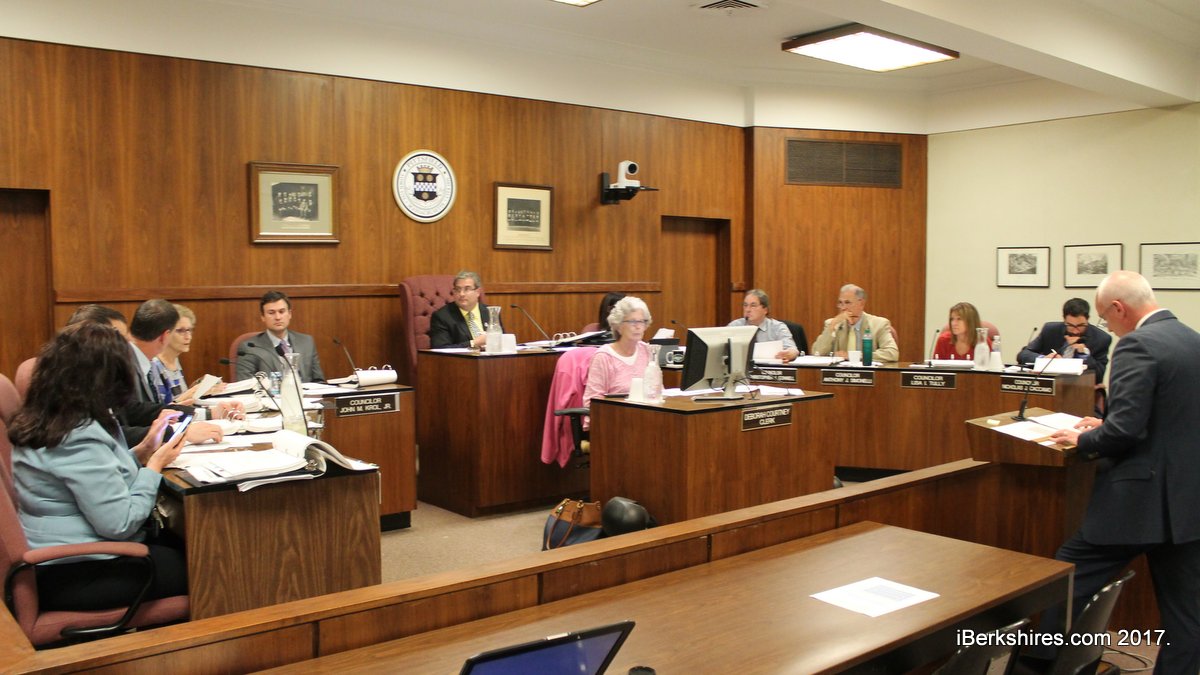
The City Council handles the most complicated budget, the Department of Public Services, on Thursday night.
PITTSFIELD, Mass. — The fourth night of budget hearings was all about consolidation, and confusion.
The biggest budget up for debate was for the Department of Public Service. Mayor Linda Tyer's budget calls for the consolidation of the Parks, some functions of Building Maintenance, and some Department of Utility functions.
It also calls for one commissioner to oversee both the Department of Utilities and the Department of Public Services.
However, so many changes to the financials and the procedure of how to consolidate into one commissioner for utilities and services made it difficult.
The evening started out with a $90,276 difference in the bottom line of the Public Service budget, which nearly got the budget tabled. But, with updated numbers, the council proceeded with the review.
Director of Finance Matthew Kerwood had printed an update Public Service budget, which clarified past data. But moments before the meeting, he became aware that some hidden cells in the Excel spreadsheet had influenced the bottom line when they should have been eliminated. The line item budget was accurate but what was presented as a bottom line was different.
"At the last moment we actually identified some further clarifications," Kerwood said. "The clarifications actually reduce the FY18 appropriation."
He invited the council to table the budget for another meeting to review the new bottom line. But, Council President Peter Marchetti urged the group to keep on going because the entire document needs to be approved by June 13.
"The only difference you will see is that the bottom line numbers will be different," Kerwood said, adding that the complications arose from the merging of multiple departmental budget and lines into one.
Councilor at Large Melissa Mazzeo then questioned the city's ability to eliminate the line for the commissioner of public utilities that had been funded in the budget partly through Public Services and partly through Utilities.
Mazzeo wasn't opposed to the consolidation but cited the city code as stating that the city must have commissioners for each. That, however, also became questioned because there is still a Department of Public Utilities budget and the salary for the one commissioner for both is split among the two.
"It is not that difficult as far as understanding what is happening, but there is a step we are missing," Mazzeo said.
Tyer said the references in the city code about having that position is part of transitional guidelines in place as the city moved from the last charter to the new one.
"We still have the ability to make amendments to the city code about the way our government is structured," Tyer said.
And then there was confusion over what some assumed was a typo in the city code in that the line reads the city must have a Department of Public Services with a commissioner of public services and a Department of Public Utilities, but that said with a commissioner of public services as well.
The councilors praised the consolidation efforts. It was the procedure which added confusion.
"I think in tough times we have to make tough decisions," Councilor at Large Peter White said. "To me, I would rather see us save more people on the ground that to have the luxury of two departments heads right now,"
Later in the evening, the council got into a lengthy debate over the Department of Community Development's budget over an $8,065 cut to the allocation for Downtown Pittsfield Inc.
The council approved budgets for Public Service, the enterprise accounts for water, wastewater, and sewer, Building Maintenance, the library, Community Development, and the airport.
Below you will find more detailed notes about each budget, and the discussion the council had.
Public Services
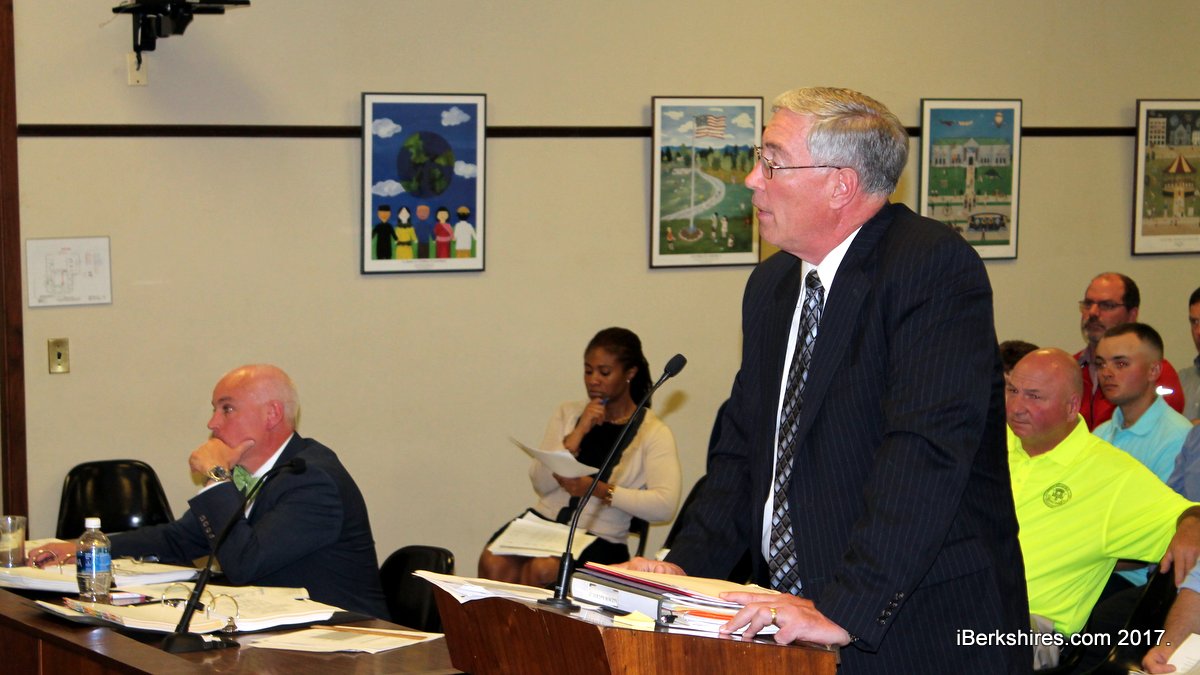
Commissioner of Public Services David Turocy is currently overseeing both the Department of Utilities and the Department of Public Services.
The original bottom line listed in the budget document was $8,113,372. But, it was found that some glitches in the Excel formulas had led to a couple hidden cells, a few of which were transferred into the document from other departments and ultimately duplicated in the sum.
Director of Finance Matthew Kerwood updated that bottom line to read $8,023,126.
The City Council made a $4,300 cut to that number and approved a total budget of $8,18,026. The budget includes more than two dozen new lines. The engineering, the Department of Public Utilities administration, the Parks and Grounds, and few lines from the Building Maintenance Department were all condensed into this budget. A single department head, currently David Turocy, will oversee all of those functions.
The cut came from the inspector of weights and measures. Ward 4 Councilor Christopher Connell looked at the current year to date numbers showing that only 77 percent of that had been spent. Yet, the budget called for an increase of $1,269.
"We only have another month. I can't believe realistically in a month's time we would be spending this $10,000," Connell said of the current expenditure figures.
Turocy said that figure is a salary and he didn't have an answer for why the money hadn't been spent. Director of Personnel Michael Taylor reviewed the numbers and determined that it was overfunded in the proposed budget based on the salary scale and job grade. He determined the budget was $4,397 more than it needed to be.
"I think it is overfunded," Taylor said.
Connell successfully cut $4,300 to bring it more in line with the actual cost. Connell then questioned seasonal labor, which is budgeted at $90,000. That $90,000 is a consolidated number for both the Department of Public Services and the Parks Department. He said the expenditures aren't trending at a pace to use up the current budget.
"It seems we haven't utilized everything we budgeted for last year," Connell said.
Turocy said those numbers will pick up with the onset of summer and that he's started hiring people. Turocy added that this year may be off because he had cut down on discretionary spending to handle the deficit in snow and ice and got a late start to hiring for seasonal help.
"All of these salaries are going to hit this month," he said.
Connell questioned the traffic signal maintenance line, funded at $100,000. Turocy said that was a new item. He said two years ago he was getting bills in the range of $15,000 to $20,000 every month for needed work on traffic signals. That was coming out of the street repair line. Now, he has cut the street repair line by $100,000 and moved it into this new line to show more accurately where the money is going.
The budget also shows scheduled overtime, which is being taken from the unclassified budget and being placed in departmental budgets, putting the department heads more in control of how that money is spent.
|
Account Name |
2016 Approval |
2017 Approval |
2018 Approval |
|
Commissioner of Public Service |
$1 |
$87,339 |
$45,880 |
|
City Engineer |
$72,190 |
$72,462 |
$72,000 |
|
Inspector of Weights and Measures |
$40,070 |
$46,477 |
$47,746 |
|
Office Manager (DPU ADMIN) |
$38,890 |
$40,254 |
$41,258 |
|
Jr. Civil Engineer (DPU ENGINEER) |
$39,440 |
$40,006 |
$0 |
|
Superintendent |
$59,215 |
$55,970 |
$57,330 |
|
Street Compliance Inspector |
$53,369 |
$54,169 |
$55,650 |
|
Chief Street Foreman |
$50,786 |
$0 |
$0 |
|
Highway Maintenance Craftsman |
$231,061 |
$227,228 |
239,365 |
|
Parking Garage Manager (BUILDING) |
$54,182 |
$53,985 |
$53,768 |
|
Parking Control Officers (BUILDING) |
$56,173 |
$58,222 |
$61,055 |
|
Administrative Assistant (DPU ADMIN) |
$33,370 |
$34,708 |
$35,572 |
|
Fleet Manager |
$49,560 |
$51,548 |
$51,666 |
|
Working Foreman |
$50,786 |
$51,290 |
$47,746 |
|
Motor Equipment Repairman |
$211,961 |
$215,183 |
$229,089 |
|
MEO-2 (PARKS) |
$39,586 |
$41,396 |
$44,401 |
|
Parks Craftsman (PARKS) |
$0 |
$0 |
$45,800 |
|
Custodian (BUILDING) |
$31,031 |
$28,707 |
$28,793 |
|
Signal Maintainer |
$44,668 |
$44,668 |
$37,000 |
|
Park Maintenance Men |
$165,589 |
$166,889 |
$127,986 |
|
Senior Clerk Typist |
$30,379 |
$30,901 |
$31,658 |
|
Park Maintenance Superintendent (PARKS) |
$59,212 |
$60,099 |
$61,745 |
|
Seasonal Labor |
$30,000 |
$30,000 |
$90,000 |
|
Seasonal Labor (PARKS) |
$65,000 |
$60,000 |
$0 |
|
Scheduled Overtime (PARKS/UNCLASSIFIED) |
$0 |
$40,000 |
$0 |
|
Scheduled Overtime |
$85,000 |
$85,000 |
$125,000 |
|
Snow/Ice Overtime |
$100,000 |
$100,00 |
$100,000 |
|
Equipment Operators |
$216,635 |
$213,471 |
$223,096 |
|
Contractual Services |
$0 |
$100,000 |
$100,000 |
|
Contractual Allowances |
$0 |
$0 |
$12,500 |
|
Contractual Allowances (PARKS) |
$0 |
$1,500 |
$0 |
|
Traffic Signal Maintenance |
$0 |
$0 |
$100,000 |
|
Utilities |
$50,000 |
$80,000 |
$80,000 |
|
Street Lighting |
$450,000 |
$480,000 |
$480,000 |
|
Maintenance |
$115,000 |
$115,000 |
$100,000 |
|
Collegiate Baseball/ Wahconah Park (PARKS) |
$10,000 |
$10,000 |
$0 |
|
Maintenance of School Fields |
$15,00 |
$15,000 |
$15,000 |
|
Repairs/Services (BUILDING) |
$55,000 |
$55,000 |
$55,000 |
|
Garage Maintenance |
$200,000 |
$220,000 |
$220,000 |
|
Rental Expense |
$57,672 |
$57,672 |
$71,250 |
|
Repairs - Streets |
$288,500 |
$350,000 |
$250,000 |
|
Streetscape Maintenance |
$25,000 |
$35,000 |
$35,000 |
|
Solid Waste Collection (DPU ADMIN) |
$1,208,104 |
$1,220,302 |
$1,251,889 |
|
Solid Waste Disposal (DPU ADMIN) |
$972,000 |
$1,066,000 |
$1,138,634 |
|
Solid Waste Recycle (DPU ADMIN) |
$716,400 |
$722,700 |
$763,349 |
|
Household Haz Waste Collection (DPU ADMIN) |
$8,000 |
$0 |
$6,000 |
|
Landfill Monitoring (DPU ADMIN) |
$106,000 |
$106,000 |
$100,000 |
|
Sand |
$550,000 |
$700,000 |
$700,000 |
|
Professional Services (DPU ENGINEERING) |
$10,900 |
$10,900 |
$10,900 |
|
Garage Supplies |
$20,000 |
$20,000 |
$20,000 |
|
Office Supplies (DPU ADMIN) |
$7,000 |
$7,000 |
$10,000 |
|
Supplies (DPU ENGINEERING) |
$500 |
$3,000 |
$0 |
|
Maintenance of Parks (PARKS) |
$88,500 |
$88,500 |
$100,000 |
|
Gasoline and Diesel Oil |
$500,000 |
$400,000 |
$330,000 |
|
Tree Operations |
$60,000 |
$70,000 |
$75,000 |
|
Equipment (PARKS) |
$15,000 |
$15,000 |
$15,000 |
|
Highway and Traffic Supplies |
$35,000 |
$35,000 |
$30,000 |
|
Total |
$3,490,909
(Excluding the lines transferred from other departments)
|
$3,957,916
(Excluding the lines transferred from other departments)
|
$8,023,126 |
Engineering
The Engineering budget was consolidated into the Public Services budget.
|
Account Name |
2016 Approval |
2017 Approval |
2018 Approval |
|
City Engineer |
$72,190 |
$72,462 |
$0 |
|
Junior Civil Engineer |
$39,440 |
$40,006 |
$0 |
|
Senior Clerk Typist |
$27,920 |
$29,048 |
$0 |
|
Professional Services |
$10,900 |
$10,900 |
$0 |
|
Supplies |
$500 |
$3,000 |
$0 |
|
Total |
$150,950 |
$150,950 |
$0 |
Parks and Grounds
Parks was transferred into the Public Services Department budget.
|
Account Name |
2016 Approval |
2017 Approval |
2018 Approval |
|
MEO-2 |
$39,586 |
41,396 |
$0 |
|
Park Maintenance Men |
$165,589 |
$166,889 |
$0 |
|
Park Maintenance Superintendent |
$59,212 |
$60,099 |
$0 |
|
Seasonal Labor |
$55,000 |
$60,000 |
$0 |
|
Collegiate Baseball/Wahconah Park |
$10,000 |
$10,000 |
$0 |
|
Maintenance of School Fields |
$15,000 |
$15,000 |
$0 |
|
Maintenance of Parks |
$88,500 |
$88,500 |
$0 |
|
Equipment |
$15,000 |
$15,000 |
$0 |
|
Total |
$459,387 |
$444,387 |
$0
|
Public Utilities
The Public Utilities administration budget was transferred to the Public Services budget.
|
Account Name |
2016 Approval |
2017 Approval |
2018 Approval |
|
Commissioner of Public Utilities |
$89,530 |
$89,865 |
$0 |
|
Office Manager |
$38,890 |
$40,254 |
$0 |
|
Administrative Assistant |
$33,370 |
$34,708 |
$0 |
|
Solid Waste Collection |
$1,208,104 |
$1,220,302 |
$0 |
|
Solid Waste Disposal |
$972,000 |
$1,066,000 |
$0 |
|
Solid Waste Recycle |
$716,400 |
$722,700 |
$0 |
|
Household Hazardous Waste Collection |
$8,000 |
$0 |
$0 |
|
Landfill Monitoring |
$106,000 |
$106,000 |
$0 |
|
Office Supplies |
$7,000 |
$7,000 |
$0 |
|
Total |
$3,179,294 |
$3,286,829 |
$0 |
Water Treatment
The Water Treatment budget, which is an enterprise account funded by utility bills, was approved at $5,047,116. That is up by 12.4 percent from last year, for a total of $557,993 more. The majority of that comes from long-term debt interest payments, which jumped by $334,786.
Ward 4 Councilor Christopher Connell questioned the acquisition of equipment line of $75,000. Connell has routinely voiced concern with the number of vehicles used at the water and wastewater plant.
Commissioner of Public Services David Turocy said part of that money will buy a new pickup truck, as the department does every year. The department will then give a vehicle to other departments, such as highway or parks. In the case of an emergency, it is the plant's trucks that will be needed to go so it is important to keep up with the fleet, he said.
"Those are the front line vehicles. They have to run. We try to keep them in good shape," Turocy said.
The budget was approved with no other discussion.
|
Account Name |
2016 Approval |
2017 Approval |
2018 Approval |
|
Commissioner of Public Utilities |
$0 |
$0 |
$22,940 |
|
Water Superintendent |
$57,772 |
$60,100 |
$61,898 |
|
Working Foreman |
$49,304 |
$51,290 |
$52,571 |
|
Sr. Civil Engineer |
$29,892 |
$30,340 |
$30,485 |
|
Wtr./Swr. Maintenance Person |
$154,104 |
$154,312 |
$164,310 |
|
GIS Coordinator |
$29,892 |
$30,340 |
$30,485 |
|
Water Mach. Repairman |
$76,652 |
$77,762 |
$79,618 |
|
Chief TPO Non-Shift |
$0 |
$50,170 |
$54,170 |
|
Head TPO Non-Shift |
$51,548 |
$0 |
$0 |
|
TPO Non-Shift |
$187,108 |
$207,345 |
$214,855 |
|
Meter Reader |
$34,161 |
$34,666 |
$36,521 |
|
Senior Clerk Typist |
$35,057 |
$36,292 |
$38,465 |
|
Seasonal Labor |
$38,400 |
$38,400 |
$38,400 |
|
Overtime |
$95,000 |
$95,000 |
$95,000 |
|
Contractual Allowances |
$0 |
$4,500 |
$4,500 |
|
Utilities |
$370,000 |
$350,000 |
$350,000 |
|
Taxes |
$140,000 |
$146,000 |
$180,000 |
|
Maintenance |
$290,000 |
$300,000 |
$300,000 |
|
Contractual Services |
$200,000 |
$200,000 |
$200,000 |
|
Professional Services |
$180,000 |
$180,000 |
$180,000 |
|
Supplies |
$40,000 |
$40,000 |
$40,000 |
|
Chemicals |
$290,000 |
$290,000 |
$290,000 |
|
Capital Improvements |
$50,000 |
$0 |
$0 |
|
Acquisition of Equipment |
$75,000 |
$75,000 |
$75,000 |
|
Maturing Debt |
$670,867 |
$732,433 |
$827,088 |
|
Interest on Debt |
$380,368 |
$336,362 |
$671,148 |
|
Debt Issuance Cost |
$15,000 |
$15,000 |
$15,000 |
|
Allocation to General Fund |
$854,865 |
$949,811 |
$969,602 |
|
Total |
$4,394,963 |
$4,489,123 |
$5,047,116 |
Sewer Enterprise
The Sewer Enterprise was passed at $460,844 with limited discussion.
|
Account Name |
2016 Approval |
2017 Approval |
2018 Approval |
|
Working Forman |
$49,304 |
$44,221 |
$45,554 |
|
Wtr./Swr. Maintenance Persons |
$149,739 |
$152,170 |
$153,790 |
|
Overtime |
$50,000 |
$50,000 |
$50,000 |
|
Contractual Allowances |
$0 |
$1,500 |
$1,500 |
|
Utilities |
$30,000 |
$30,000 |
$30,000 |
|
Maintenance |
$50,000 |
$40,000 |
$40,000 |
|
Stormwater Services |
$25,000 |
$25,000 |
$25,000 |
|
Contractual Services |
$85,000 |
$95,000 |
$95,000 |
|
Mains and Manhole Supplies |
$20,000 |
$20,000 |
$20,000 |
|
Total |
$459,043 |
$457,891 |
$460,844 |
Waste Water
The wastewater treatment plant budget, which is an enterprise account funded through utility bills, passed with no discussion.
|
Account Name |
2016 Approval |
2017 Approval |
2018 Approval |
|
Comm of Public Works |
$0 |
$0 |
$22,940 |
|
Sewer Superintendent |
$59,212 |
$61,604 |
$63,452 |
|
Work Foreman Water Machine Repairmen |
$46,933 |
$48,819 |
$44,432 |
|
Sr. Civil Engineer |
$29,892 |
$30,340 |
$30,485 |
|
Chemist |
$53,369 |
$55,523 |
$57,191 |
|
GIS Coordinator |
$29,892 |
$30,340 |
$30,485 |
|
Water Machine Repairmen |
$151,905 |
$151,070 |
$149,571 |
|
Lab Technicians |
$76,503 |
$71,465 |
$75,138 |
|
Chief TPO Shift |
$52,057 |
$54,170 |
$50,541 |
|
Head TPO Shift |
$193,843 |
$194,791 |
$194,382 |
|
TPO Shift |
$329,999 |
$361,918 |
$365,698 |
|
Head TPO Float Shift |
$81,894 |
$87,338 |
$81,223 |
|
Senior Clerk Typist |
$30,379 |
$31,587 |
$32,536 |
|
Seasonal Labor |
$38,400 |
$38,400 |
$38,400 |
|
Overtime |
$95,000 |
$95,000 |
$95,000 |
|
Contractual Allowances |
$0 |
$6,000 |
$6,000 |
|
Utilities |
$550,000 |
$500,000 |
$500,000 |
|
Chemical Process |
$230,000 |
$220,000 |
$220,000 |
|
Maintenance |
$280,000 |
$260,000 |
$260,000 |
|
Sludge Handling |
$375,000 |
$375,000 |
$375,000 |
|
Contractual Services |
$110,000 |
$110,000 |
$110,000 |
|
Professional Services |
$180,000 |
$180,000 |
$180,000 |
|
Supplies |
$50,000 |
$45,000 |
$45,000 |
|
Capital Improvements |
$50,000 |
$0 |
$50,000 |
|
Acquisition of Equipment |
$50,000 |
$50,000 |
$50,000 |
|
Maturing Debt |
$627,809 |
$728,981 |
$1,024,386 |
|
Interest on Debt |
$384,403 |
$442,095 |
$802,386 |
|
Debt Issuance Costs |
$15,000 |
$25,000 |
$50,000 |
|
Allocation to the General Fund |
$453,772 |
$847,742 |
$886,636 |
|
Total |
$4,620,962 |
$5,102,183 |
$5,868,535 |
Maintenance: City
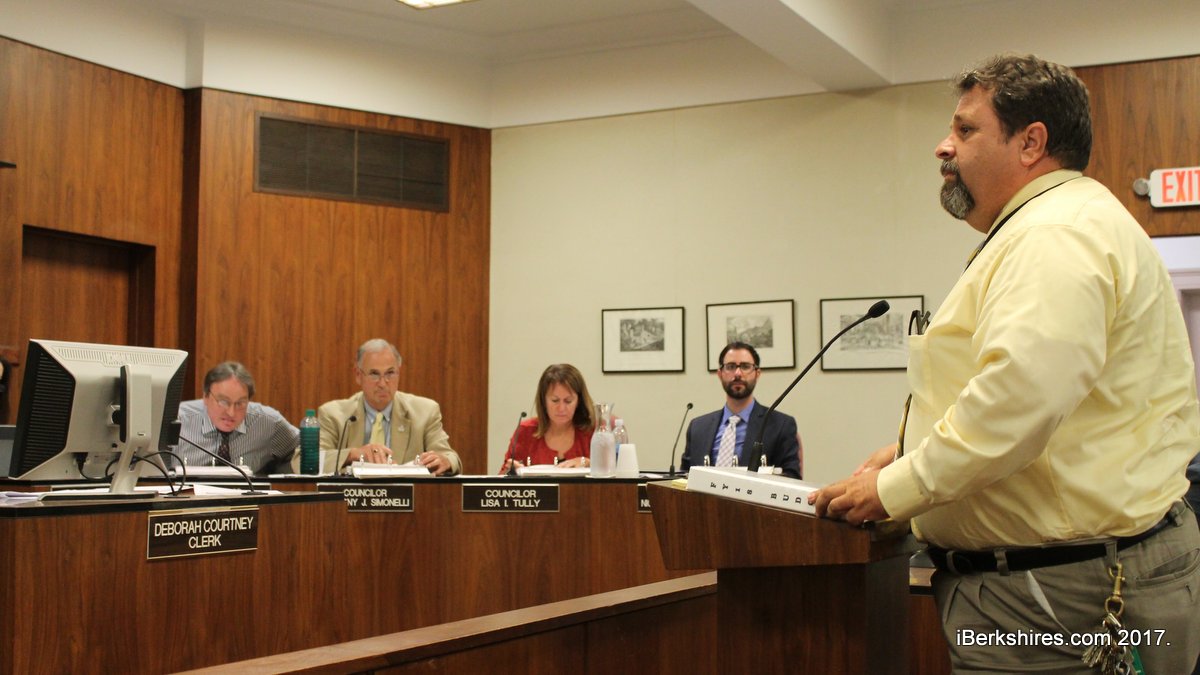
Building Maintenance Director Brian Filiault says he is organizing his department to absorb the loss of an assistant director job.
The Building Maintenance budget was passed at the proposed $1,649,703, which is $160,915 less than last year. However, multiple lines had been transferred over to the Department of Public Services.
Notably is the elimination of an assistant director of building maintenance, at a cut of $59,737.
"We are reorganizing the office and we are trying to sprinkle that work throughout the staff in the office," Director Brian Filiault said.
Another addition is $40,000 for scheduled overtime. That money was formerly kept in the unclassified budget and, as with other departments, is now going to be under the individual departmental budgets.
This line is also where the garage repairs line used to be held; that was moved to the Department of Public Services and will be funded through parking meter revenue.
|
Account Name |
2016 Approval |
2017 Approval |
2018 Approval |
|
Director of Maintenance |
$67,522 |
$67,264 |
$64,022 |
|
Boiler/HVAC Repairman |
$43,995 |
$44,485 |
$45,846 |
|
Painter |
$44,151 |
$44,652 |
$43,721 |
|
Parking Garage Manager (Transferred to Public Services) |
$54,182 |
$53,985 |
$0 |
|
Parking Control Officers (Transferred to Public Services) |
$56,173 |
$58,222 |
$0 |
|
Working Foreman Craft |
$44,666 |
$47,455 |
$52,311 |
|
Plumber |
$87,660 |
$89,645 |
$96,023 |
|
Carpenters |
$135,428 |
$133,513 |
$142,919 |
|
Principal Clerk |
$27,913 |
$33,071 |
$37,375 |
|
HVAC Technician |
$88,526 |
$90,510 |
$93,603 |
|
Custodian |
$31,031 |
$32,999 |
$34,747 |
|
Custodian (Transferred to Public Services) |
$0 |
$28,707 |
$0 |
|
Office Manager |
$36,093 |
$42,767 |
$49,542 |
|
Electricians |
$131,823 |
$132,606 |
$139,969 |
|
Seasonal Labor |
$16,000 |
$16,000 |
$10,000 |
|
Temporary Labor |
$0 |
$0 |
$40,000 |
|
Custodial Labor Rentals |
$30,000 |
$30,000 |
$25,000 |
|
Assistant Director of Maintenance |
$59,966 |
$59,737 |
$0 |
|
Utilities |
$520,000 |
$520,000 |
$520,000 |
|
Repairs Municipal |
$225,200 |
$205,200 |
$239,826 |
|
Abandoned Property |
$0 |
$20,000 |
$10,000 |
|
Contractual Allowances |
$4,800 |
$4,800 |
$4,800 |
|
Repairs/Services Garage (Transferred to Public Services) |
$55,000 |
$55,000
|
$0 |
|
Total |
$1,760,129 |
$1,810,618 |
$1,649,703 |
Maintenance: School
The maintenance for schools passed with no discussion. The budget is increasing by $145,000.
|
Account Name |
2016 Approval |
2017 Approval |
2018 Approval |
|
Contractual Services |
$257,500 |
$217,500 |
$325,000 |
|
Maintenance Supplies |
$217,000 |
$257,500
|
$295,000 |
|
Total |
$475,000 |
$475,000 |
$620,000 |
Berkshire Athenaeum
The library budget was approved at $1,044,965, which is $348 more than last year.
The City Council questioned only the director's salary. The city code sets a salary scale for the position but the library's Board of Trustees hadn't followed it when offering a contract to Director Alex Reczkowski.
"If we don't have the ability to say yes or no on that, then why is it in [the city code]?" questioned Councilor at Large Melissa Mazzeo.
The director does not come before the council for confirmation and the Board of Directors does all of the contract negotiations. Councilor at Large Kathleen Amuso is a trustee and said historically that was the process.
For the most part, the budget closely mirror's last year with the biggest changes coming via a $12,578 reduction for part-time shelvers and a 10,503 decrease for a supervisor specialist. The library does look to add three part-time library assistants at an additional cost of $12,204.
|
Account Name |
2016 Approval |
2017 Approval |
2018 Approval |
|
Senior Supervisors |
$193,165 |
$190,949 |
$195,763 |
|
Supervisor Specialist |
$45,105 |
$47,323 |
$36,820 |
|
Supervisor Specialist |
$116,590 |
$123,986 |
$121,997 |
|
Library Assistant II |
$48,305 |
$51,324 |
$63,528 |
|
Senior Technicians |
$97,344 |
$102,504 |
$106,373 |
|
Senior Assistants |
$67,098 |
$76,210 |
$81,194 |
|
Director of Athenaeum |
$78,337 |
$66,022 |
$67,673 |
|
Library Custodians |
$61,573 |
$65,320 |
$65,389 |
|
Library Assistant I |
$60,431 |
$67,950 |
$65,433 |
|
Library Technicians |
$60,113 |
$63,642 |
$64,751 |
|
Library Shelvers |
$58,733 |
$57,242 |
$54,664 |
|
Equipment Maintenance |
$1,000 |
$1,000 |
$1,000 |
|
Library Staff Development |
$1,000 |
$1,000 |
$1,000 |
|
Supplies - General |
$12,000 |
$13,000 |
$13,000 |
|
Supplies - Custodial |
$6,000 |
$6,500 |
$6,500 |
|
Binding and Microfilm |
$2,200 |
$3,345 |
$3,648 |
|
Newspapers and Periodicals |
$13,000 |
$13,000 |
$13,000 |
|
Books and Audio Visual |
$75,000 |
$29,320 |
$29,365 |
|
Travel |
$1,500 |
$1,500 |
$1,500 |
|
Reimbursement |
($45,453) |
$0 |
$0 |
|
Unclassified - Library |
$2,000 |
$2,000 |
$2,000 |
|
Library Networking Fees |
$43,125 |
$49,980 |
$49,980 |
|
Theft Deterrent System |
$1,000 |
$1,500 |
$1,500 |
|
Total |
$998,666 |
$1,044,617 |
$1,044,985 |
Community Development
Perhaps the lengthiest debate of the night was on the Community Development budget, in particular, a $8,065 cut to the city's allocation to Downtown Pittsfield Inc.
In total, the budget was approved at $666,938, which shows a $25,660 increase. Nearly all of that increase is attributed to a new position of business development manager — at a cost of $24,663. That salary is only a portion of the total cost for the job, which will oversee efforts for the Pittsfield Economic Development Agency and the Pittsfield Economic Revitalization Corp.
The city and the two quasi-public agencies are combining efforts in Mayor Linda Tyer's "red carpet team" approach to economic development. A job description hasn't be formalized but Tyer said the person would focus on recruiting new businesses, marketing the city for business development, and helping existing businesses grow.
The biggest question from the council was on the reduction to Downtown Pittsfield Inc. DPI President Jesse Cook-Dubin said this makes two consecutive years of decreasing city support. Last year, the organization saw about a quarter of its funding cut, from $43,000 to $32,150. Tyer's budget called for yet another 25 percent reduction to $24,185.
Cook-Dubin said that leaves the organization with only two options to make up the difference. First, it could use some of the cash cushion it has set aside, which is only two months worth of operational funding. Cook-Dubin said losing one sponsor could put the organization in trouble if that cushion is eroded.
"We obviously don't want to run those down as much as necessary," Cook-Dubin said.
The second option is to take another look at the budget and cut some of the marketing efforts the organization does or cut the downtown ambassador program. Cook-Dubin said right now there is little marketing going on for strictly Pittsfield and the organization has been doing its marketing with a minimal budget as is.
Council Vice President John Krol was particularly concerned about any reduction in marketing saying it would be "cutting off our nose to spite our face." He said marketing dollars bring more money back to the economy.
Ward 1 Councilor Lisa Tully suggested moving $7,000 from the human services line but failed to get support for that. The human services line had been hotly debated last year when the mayor attempted to eliminate the expense altogether. Director of Community Development Bonnie Gallant said 16 non-profit organizations last year benefited from some $138,000 in funding. This year, at $107,000, awards will be made to fewer groups.
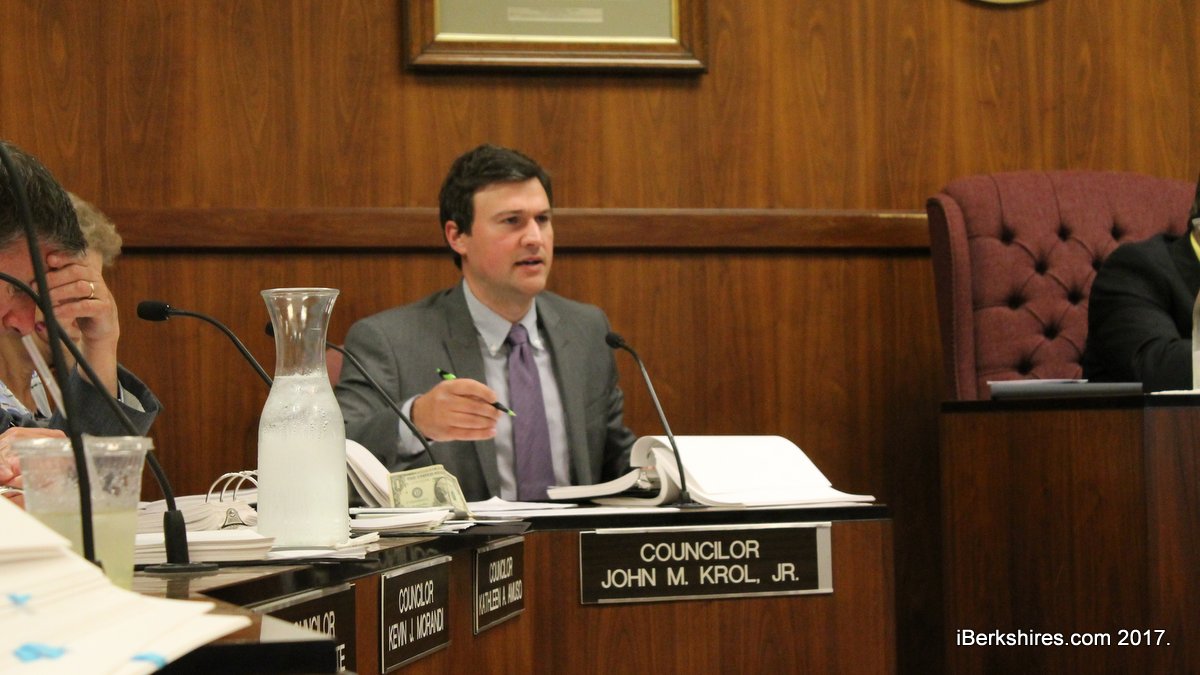
Council Vice President John Krol motioned to send the budget back to the mayor for more funding for Downtown Pittsfield Inc. but he did not get enough support from the rest of the council.
Councilor at Large Melissa Mazzeo joined nearly everybody else on the council praising the work Downtown Pittsfield does. She said if there was any room in the budget to move money around to fund the organization, she'd like to see it happen.
Ward 4 Councilor Christopher Connell said, "I just think we would be shooting ourselves in the foot if we really cut this organization with all of the good work they do in our downtown."
Tyer said the cut wasn't a reflection of the work the organization is doing, but her way of spreading out the sacrifices in the budget. All city departments had to come in level-funded or below, for the most part, and this was one of the several areas to reduce.
Councilor at Large Peter White said he appreciates the work Downtown Pittsfield does, but when school teachers are being laid off in the budget, the "tough choice" of making cuts elsewhere makes the reduction necessary. Ward 2 Councilor Kevin Morandi agreed, "to send [budgets] back and add things, I can't support that."
Krol motioned to do just that, send the budget back to the mayor and have her come up with additional funds for Downtown Pittsfield. His motion failed by a 6-5 margin, with support from Councilor at Large Kathleen Amuso, Mazzeo, Connell, and Ward 3 Councilor Nicholas Caccamo and all others opposed. Krol, Connell, and Mazzeo ultimately voted against the entire Community Development budget because of that.
The council also backed a $19,950 increase for lake management, which will expand the weed treatment at Onota Lake. Nearly all of the councilors called the lake a "gem" and expressed frustration with a number of weeds.
"The lake is indeed a jewel and does need to be maintained," Ward 7 Councilor Anthony Simonelli said.
|
Account Name |
2016 Approval |
2017 Approval |
2018 Approval |
|
Director |
$40,852 |
$40,851 |
$41,712 |
|
Parks Open Space Planner |
$64,250 |
$64,001 |
$64,000 |
|
City Planner |
$61,150 |
$61,150 |
$60,916 |
|
Conservation Agent |
$49,070 |
$50,851 |
$52,833 |
|
Planning Administrator |
$4,000 |
$4,000 |
$0 |
|
Executive Secretary |
$40,456 |
$40,905 |
$41,671 |
|
Community Development Specialist |
$47,579 |
$47,579 |
$50,677 |
|
Administrative Assistant |
$6,997 |
$7,192 |
$6,381 |
|
Playground Leaders |
$18,879 |
$18,879 |
$18,356 |
|
ZBA Clerk |
$801 |
$0 |
$0 |
|
Seasonal Labor |
$17,195 |
$17,195 |
$15,000 |
|
Recreation Coordinator |
$40,456 |
$40,905 |
$41,671 |
|
Human Services |
$140,000 |
$138,000 |
$107,000 |
|
Land Use and Zoning |
$0 |
$2,000 |
$2,000 |
|
Lake Management |
$20,000 |
$35,000 |
$54,950 |
|
Supplies |
$8,000 |
$8,000 |
$7,995 |
|
Recreation Programs |
$7,000 |
$7,500 |
$7,500 |
|
Downtown Inc. |
$43,000 |
$32,250 |
$24,185 |
|
Tyler Street Business Group |
$1,000 |
$10,000 |
$2,500 |
|
Planning Studies |
$15,000 |
$15,000 |
$5,000 |
|
BRPC Assessment |
$0 |
$0 |
$33,928 |
|
Total |
$625,665 |
$641,258 |
$666,938 |
Airport
The airport budget of $270, 941 passed with little discussion.
The budget is $67,645 more than last year, which represents a 33 percent increase. The majority of was $47,755 for an assistant airport manager.
The rest of that is a $15,000 increase because the scheduled overtime, which was previously kept in the unclassified budget, is moving into the departmental budget. And the airport is putting $18,500 more into maintenance to comply with grant assurances put in place through recent federally and state-funded capital projects.
The airport is also reducing the airport inspector salary by $11,215 and cutting snow removal by $4,500.
|
Account Name |
2016 Approval |
2017 Approval |
2018 Approval |
|
Airport Manager |
$58,204 |
$58,204 |
$59,659 |
|
Assistant Airport Manager |
$0 |
$0 |
$47,755 |
|
Airport Inspector |
$45,370 |
$45,370 |
$34,155 |
|
Scheduled Overtime |
$0 |
$0 |
$15,000 |
|
Commission Clerk |
$1,560 |
$1,872 |
$1,872 |
|
Contractual Services |
$11,100 |
$12,000 |
$12,000 |
|
Utilities |
$55,000 |
$56,800 |
$56,800 |
|
Telephone |
$1,560 |
$1,500 |
$2,200 |
|
Maintenance |
$14,500 |
$15,000 |
$33,500 |
|
Snow Removal |
$8,000 |
$8,500 |
$4,000 |
|
Supplies |
$2,550 |
$2,550 |
$2,500 |
|
Equipment |
$1,500 |
$1,500 |
$1,500 |
|
Total |
$199,344 |
$203,296 |
$270,941 |
Day 5

.JPG)


.JPG)







